Note: I'm super busy this month working on my final pre-dissertation paper for school, and it's a big one. So, Lao Ren Cha is going to be a bit quiet in November. Thanks for understanding!
I know that a huge part of the problem for pro-marriage equality advocates in Taiwan is funding: despite having fairly broad public support, they don't have a lot of money. Anti-equality hardliners, on the other hand, are pretty flush thanks to church donation networks (and international help from anti-equality religious groups, mostly from the US).
But, I have to say, I haven't seen much aggressive fundraising let alone the issue I tackle in my latest for Ketagalan Media: the fact that the bad guys are out-organizing us. They have more people on the streets, more fliers, more Line group invasive posting, more ads, more banners.
Banners and fliers cost money, and so do vests for volunteers if you want them. Ads are expensive. I get it - but I haven't seen much crowdfunding either.
You know what's free, though? Talking to people. Volunteers. Engaging in conversations in Line groups (if only to get the haters to keep quiet). Putting up designs drawn by volunteers for people to download and print out to make their own posters, placards and stickers.
In any case, in this piece I talk about the out-organization and how it makes it look as though pro-equality advocates are not standing up and getting votes for the upcoming referendum. I also cover the constitutionality of the anti-equality referendums and what the strategy might be behind them.
There's more to be said: the outright lies from the anti-equality camp, the attempt to rig the televised debates. I'm sure there will be more to talk about as the month goes on.
Showing posts with label marriage_equality. Show all posts
Showing posts with label marriage_equality. Show all posts
Monday, November 5, 2018
Thursday, October 25, 2018
Come to Pride this weekend
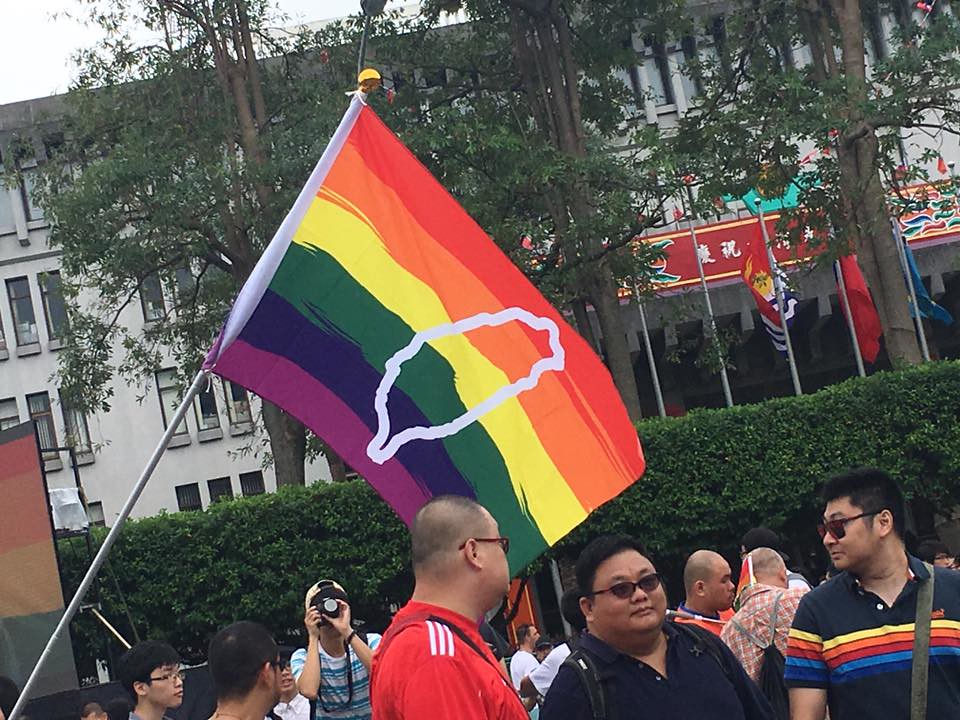 |
But, plans have changed, because Pride is this Saturday.
I'll still go to Donggang on Sunday, but it's really important that as many people as possible attend Pride this year. You should come too. And bring your friends!
In May 2017, Taiwan's highest court ruled that marriage is a right afforded all citizens with no reference to gender, and therefore marriage equality must be allowed. The court gave the government two years to work out a legislative solution: either to simply pass a law allowing marriage equality, or to change the civil code to abide by the ruling.
There have been some political ups and downs, some debate over which route is better (changing the law can likely be done quickly; changing the civil code is harder, and the ruling DPP doesn't think they have the support from the large socially-conservative-but-pro-independence segment of their base to make it happen.) There is a growing sense that the DPP hinted at support for marriage equality when campaigning, and promptly abandoned it to appease their more conservative base, and of course the KMT doesn't give a damn about anyone but the KMT. With elections coming up and the initial 2-year deadline now less than a year away, a lot of activists are upset.
This is especially important with two competing referenda coming up in about a month: one affirming Taiwan's commitment to equality, the other full of outdated, religiously-motivated and hateful garbage (yes, I'm biased). Remind people to go out and vote for love in November.
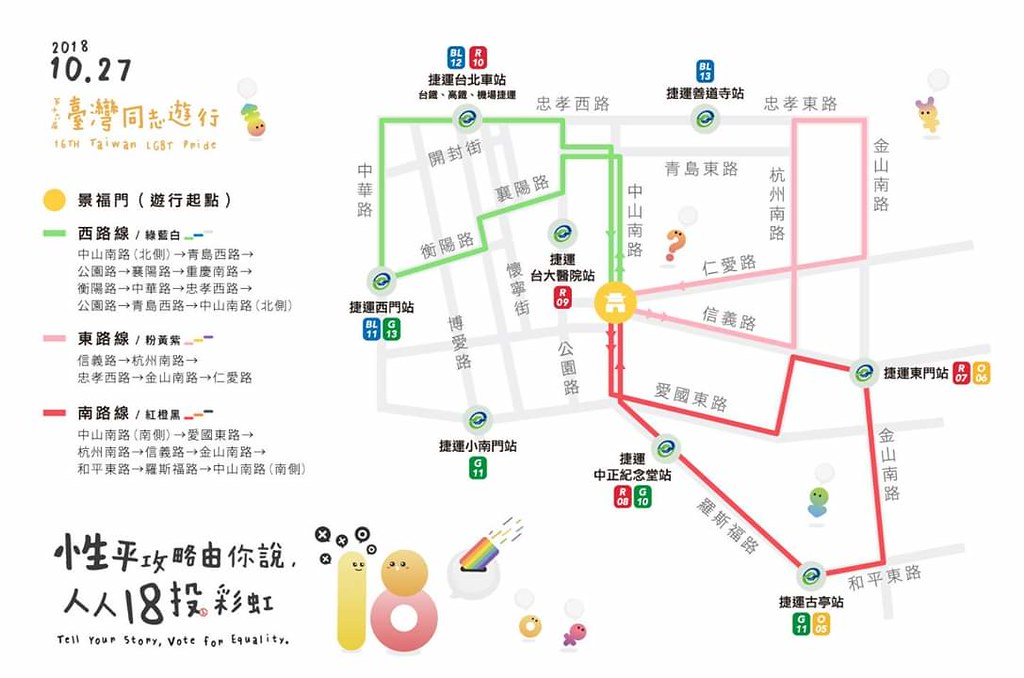 |
| Meet at 1:30 at MRT National Taiwan University Hospital station, start out at 2:30 - these are the routes. I always go the red route. |
Cue Pride. With no specific marriage equality rallies planned, and the anti-equality gay-haters being very well-organized and resourced (moreso than the pro-equality side, although I would argue the national consensus is broadly with us if you count those who are not opposed to equality), there is a sense that this year's Pride is going to be more politically charged and all about showing the government that we (LGBT people and allies/supporters) haven't forgotten.
While it's not my place to opine on what Pride should be, I can say what I think it's likely to be - and that you should be there. A friend of mine (gay with a Taiwanese partner if it matters) was also saying he was hoping this year would be super politically charged and motivated. There's a sense in the air that this is what's happening, but we need numbers.
All are welcome at Pride, which means you can be a part of it. You can add to those numbers. You can make it clear that equal rights matter, and it's time for the government to stop pandering to prejudice and outdated, discriminatory thinking.
Pride Taipei usually makes international news - at least it has in the years surrounding the 2017 ruling, as the world watches to see whether Taiwan will be the first country in Asia to give equal marriage rights to all. The numbers do matter, and you do make a difference.
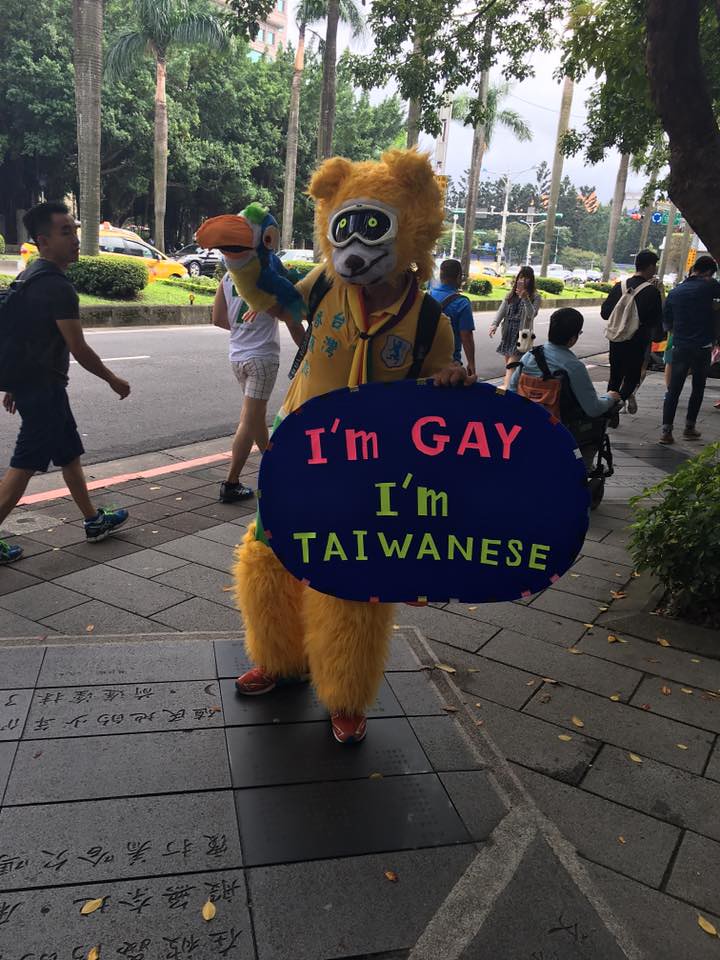
Show the LGBT community your support, and show the world that Taiwan, while imperfect, is the freest and most progressive country in Asia. Show them that we can do this, and that there is no reason why equality can't exist within Taiwanese culture.
Pride is not a rally or a protest - it's a celebration, and all are welcome. It's a great way for foreign residents, even if you are a bit reticent to attend actual protests, to show their support for this issue.
Grab your rainbow gear and come with us.
Friday, September 7, 2018
Call Taiwan a "country" in public media. Yes, it really is that simple.
Years ago, I donated to Freedom To Marry, and ended up on their e-mail list. As with all such fundraising emails, I generally delete them without reading (my apologies also to Planned Parenthood, Amnesty International and Animal Welfare League of Arlington). But, I received one today with the subject line "Taiwan", which caught my eye.
Inside, I noticed this:
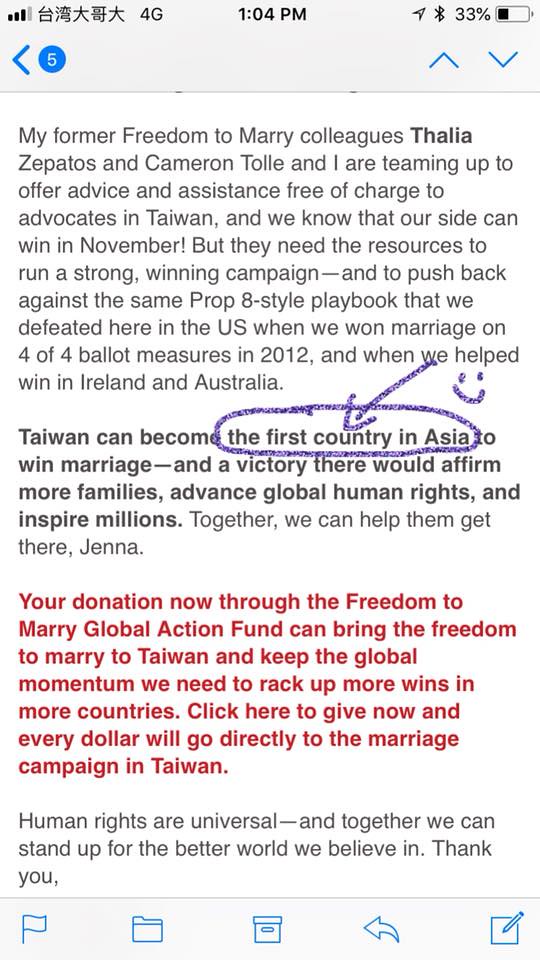
For the first time, I was happy I hadn't bothered to unsubscribe from such lists - if I had, I might not have noticed that Freedom To Marry called Taiwan a "country".
No fanfare, no convoluted wording, no kowtowing, no apologies, no explanation needed, just a country. No trumpets heralding the arrival of new terminology. No considering the feelings of some other country that does not rule this country, as though their opinion means anything at all regarding Taiwan's status as a country.
It is self-governed (and reasonably successfully so, despite some, uh, setbacks and issues), has its own contiguous territory, military, currency, immigration and visa process, postal service...you know, like countries do.
Because it is a country, they called it a country. As rational people would. Simple, effective, accurate.
This is how it should be. Not even a question. It shows how badly the media has twisted itself into knots over some other country's baby-whining about the status of this country. They try to cover it up by saying it's "neutral", "dispassionate", "straight reporting of facts without inserting political stances" when they show such cowardice in avoiding using the word "country" to describe a country, instead employing seemingly-neutral but actually offensive, pro-CCP terms like "territory" and "island" (yes, even "island") to describe Taiwan. Taiwan is not merely a territory - it has everything other countries do - and "island" is a cop-out to appease some other country's opinion of Taiwan rather than denote Taiwan's reality.
It makes sense, too. Despite marriage equality being a somewhat bipartisan issue in Taiwan (there are supporters and opponents on both sides, although the pan-greens and especially the Third Force appear to be a bit more in favor), and despite liberals in the West being kind of hopeless when it comes to understanding Taiwan, the two sides seem to have adopted oppositional "cross-strait" language on the issue. No, really: the anti-gay folks often reach for some version of "it doesn't fit with Chinese culture". The pro-equality advocates point out that this is yet one more issue which shows how different China and Taiwan are. So it makes sense that those of us fighting for recognition of the reality of LGBT+ people will tend to also use accurate, reality-based terms when referring to nations. Reality begets reality.
All that aside, it really is that simple. Just call Taiwan a country. That's all.
You don't have to do anything else, except write "country" instead of some nonsense Beijing-approved word. (Oh, you could also stop using "Mainland", "renegade province" and "separated in 1949", but frankly, using the word "country" basically clarifies all of these terms as untruthful and not descriptive of reality, so it would be natural to toss those out, too.)
The international media might want to take the box of bullshit China is forcing on the world and report as though there might be some value in it, but we can smell it for what it is. Every time we get a breath of fresh air, like Freedom To Marry just referring to Taiwan as what it is, it becomes clearer that you're just helping Beijing pass off some turds in a box.
I mean, come on, international media. We already knew you were a bunch of CCP-appeasers who regularly get up off your knees to make excuses for the way you write about Taiwan, but that others can get it right with so little fanfare really just shows how cowardly you are in starker relief.
Inside, I noticed this:

For the first time, I was happy I hadn't bothered to unsubscribe from such lists - if I had, I might not have noticed that Freedom To Marry called Taiwan a "country".
No fanfare, no convoluted wording, no kowtowing, no apologies, no explanation needed, just a country. No trumpets heralding the arrival of new terminology. No considering the feelings of some other country that does not rule this country, as though their opinion means anything at all regarding Taiwan's status as a country.
It is self-governed (and reasonably successfully so, despite some, uh, setbacks and issues), has its own contiguous territory, military, currency, immigration and visa process, postal service...you know, like countries do.
Because it is a country, they called it a country. As rational people would. Simple, effective, accurate.
This is how it should be. Not even a question. It shows how badly the media has twisted itself into knots over some other country's baby-whining about the status of this country. They try to cover it up by saying it's "neutral", "dispassionate", "straight reporting of facts without inserting political stances" when they show such cowardice in avoiding using the word "country" to describe a country, instead employing seemingly-neutral but actually offensive, pro-CCP terms like "territory" and "island" (yes, even "island") to describe Taiwan. Taiwan is not merely a territory - it has everything other countries do - and "island" is a cop-out to appease some other country's opinion of Taiwan rather than denote Taiwan's reality.
It makes sense, too. Despite marriage equality being a somewhat bipartisan issue in Taiwan (there are supporters and opponents on both sides, although the pan-greens and especially the Third Force appear to be a bit more in favor), and despite liberals in the West being kind of hopeless when it comes to understanding Taiwan, the two sides seem to have adopted oppositional "cross-strait" language on the issue. No, really: the anti-gay folks often reach for some version of "it doesn't fit with Chinese culture". The pro-equality advocates point out that this is yet one more issue which shows how different China and Taiwan are. So it makes sense that those of us fighting for recognition of the reality of LGBT+ people will tend to also use accurate, reality-based terms when referring to nations. Reality begets reality.
All that aside, it really is that simple. Just call Taiwan a country. That's all.
You don't have to do anything else, except write "country" instead of some nonsense Beijing-approved word. (Oh, you could also stop using "Mainland", "renegade province" and "separated in 1949", but frankly, using the word "country" basically clarifies all of these terms as untruthful and not descriptive of reality, so it would be natural to toss those out, too.)
The international media might want to take the box of bullshit China is forcing on the world and report as though there might be some value in it, but we can smell it for what it is. Every time we get a breath of fresh air, like Freedom To Marry just referring to Taiwan as what it is, it becomes clearer that you're just helping Beijing pass off some turds in a box.
I mean, come on, international media. We already knew you were a bunch of CCP-appeasers who regularly get up off your knees to make excuses for the way you write about Taiwan, but that others can get it right with so little fanfare really just shows how cowardly you are in starker relief.
Friday, April 20, 2018
Fading Rainbows: my latest for Ketagalan Media
I am super tired with two crazy weeks of teacher training and no weekend break. So, here's a link without fanfare (because I don't have time to create it) to my latest for Ketagalan Media, all about the current state of marriage equality in Taiwan and where we need to go from here.
Monday, April 16, 2018
Crystal Boys (孽子): A Review
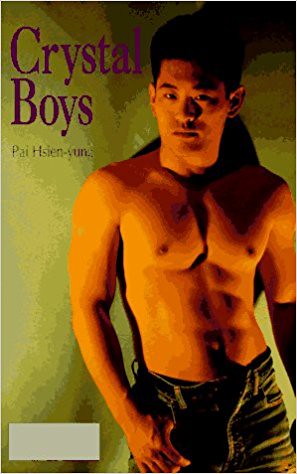 |
| The gray square is covering the words "First modern Asian gay novel". I don't know why the square is there. |
I continue to be vexed by Pai Hsien-yung.
Crystal Boys (孽子 or "Sinners" in Chinese), to be sure, was an easier read than Wandering in a Garden, Waking from a Dream for someone who cares about Taiwan directly and viscerally, in ways that affect her life, and cares about China only in that fuzzy abstract way that one might be interested in foreign affairs. The sensitivity with which Pai writes about these characters is commendable - really the bottom rung of society, if not lower - mostly boys from families who were at the bottom to begin with, who have then been turned out by those families when their sexuality was discovered. Pai manages to both portray them sympathetically and not shy away from the daily indignities not only of their lives, but (in the case of protagonist A-Qing's family) the lives of the families who have kicked them out.
Other than police raids on "New Park" (now 228 Memorial Park) where the young, gay characters spent their nights, there is nothing overtly political in Crystal Boys, and what was there can be said to be more cultural than political. The protagonist characters were more sympathethic - although the Taipei that Pai describes is not the Taipei of today - the capital of the country on the cusp of being the first in Asia to legalize marriage equality - I can see its echoes in the Taiwan I know.
When I first moved to Taiwan over a decade ago, it was still common to use "228 Park" as shorthand for "hunting for gay hookups", with very little sympathy for those who may have gone there for that reason. I now recognize how homophobic such talk was, but I won't deny it was common (I haven't heard that particular reference in at least 5 years, however). The open-air gay bar culture around Ximen feels like an institution now, but it wasn't always there - I mean, Ximen's been a center of LGBT Taipei for some time, but I remember when it wasn't so out in the open. I don't know anyone who has been disowned or chased out of their home by their parents when their sexual orientation was discovered, but I do know people who have struggled when coming out to their families, or who still feel they cannot do so.
I just found myself feeling a bit put out that, with all the empathy Pai can convey when talking about the night kingdom of the 'glass community' (whose citizens were called 'glass boys' or 'crystal boys', hence the English title of the book), he doesn't seem to be able to extend this ability to write empathetically about Taiwan as Taiwan. All of the younger characters were born in Taiwan, but few of them had Taiwanese ancestral roots: to read this book, you would think that almost everyone in Taiwan who mattered either came from China or had parents who did. This...vexes me. Taiwan is more than the sum of people who came from China, but you wouldn't know that to read this otherwise exquisite book.
Pai focuses most of the story on the denizens of "New Park" - homeless or nearly-homeless men and boys who, while not the "hustlers" of Three Rivers Street (as Pai calls them), are essentially prostitutes. If one reads it without knowing Taipei or a sense of what it may be like to live as a gay man - and I specifically mean gay man because there are no Ls, Bs or Ts in this story, only Gs - one might get the impression that all gay men in Taipei are sex workers, which of course is not the case. A few of the characters are not sex workers, but they are involved in the sex trade, e.g. acting as patrons to the boys (or, to use baser term, as sugar daddies). Only through glimpses - cracks in the storyline really - do we see a Gay Taipei that is not centered on prostitution: the college students who timidly come to the park seeking their own, the patrons of the Cozy Nest bar. That's not a criticism of the book so much as a description, but there is a criticism to be made: I could well see someone recommending this book thinking it will open the mind of a potential ally who's on the fence, and having it backfire, because the reader finishes it with the (unfair and inaccurate) impression that "gay = prostitute". This isn't helped by the implication that all of the boys who are 'out', whether they want to be or not, are so because they were discovered in flagrante delicto with another man - which probably is how most closeted gay men were discovered at that time, but still, upon reading Crystal Boys, an unfair stereotype might be confirmed in the mind of the non-discerning reader that gay men are highly sexually promiscuous.
That said, there isn't as much of a plot, per se, as a typical Western reader might expect. It's more of a series of moody set-pieces in which the characters do move forward with their lives, but not a lot...happens really. Yes, (spoiler alerts) a bar gets opened, then closed. One characterachieves his dream of going to Japan. There's a penultimate reckoning between young gay man and stand-in father figure (not his actual father). There's a long-ago New Park love story that ended in tragedy which gets hashed out. But if you're looking for an action-packed storyline, you won't find it. Personally, I'm fine with the slower, more contemplative pace. I appreciated the deep exploration of the loyalties the Crystal Boys had to each other - they formed their own family and community among a society that had kicked them aside.
Otherwise, there are both personal and political threads running through Crystal Boys - although I could find no direct reference to Pai himself being gay, it seems to be generally known that he is, and the scene where Wang Kuilong (the "Dragon Prince") has an angry - and yet sincere and caring - discussion with Papa Fu, retired ROC military officer and benefactor of the boys of New Park and whose own son committed suicide after his homosexuality was revealed - can't be read as anything other than Pai's literary rendering of a real or imagined confrontation with his own father, in which he attempts to see things from his father's perspective. Of course, the perspective can only be read with any degree of sympathy in its own era: the idea that there is any merit to feeling shame because you have a gay son only works if you buy into 'product of his time'-ism. Reading it now, it comes across as trying to defend or find sympathy for, say, a father who is so ashamed that he turns his son out on the street for the crime of being a bit short or maybe a redhead. Pai does explore the ways in which society is kinder to orphans and people born with disabilities or bodily deformities than to gay men, implying that it's unfair to feel charitably towards the former but not the latter, but never quite comes around to making it clear that sexuality is not something you choose.
Politically, Crystal Boys has been read as an allegory of Taiwan as fatherless and adrift at sea - turned out by its father (China) and now skulking about in the twilight of international affairs - a 'sinner', 'monster' or 'bastard son' as the Chinese title implies. Even A-Qing's father comes into this: losing the war, leaving China, being kicked out of the military for having been taken prisoner, he sits in stasis in Taiwan, growing old and rotted: a similar metaphor for the ROC on Taiwan as was employed in Wandering from a Garden, Waking from a Dream. Taiwan (the ROC to Pai) as a 'sinner' adrift in a world that's turned it out on the street is even more notable given that it was published in the early 1980s, when the sting of shifting recognition to the People's Republic of China was still biting. Before Taiwan woke up and realized it didn't actually want to be recognized as 'the true China', but rather simply for what it was: Taiwan.
Some try to find both local (e.g. Taiwanese) and international (e.g. ROC vs. the world) strains of political ideas in it - I have to say, I don't really see that. I do see how Wang Kuilong's and Little Jade's different experiences abroad: one cynical and tragic, the other optimistic and bright, relates to the future (from the book's perspective) of gay life and LGBT activism in Taiwan, and how that was impacted by international cultural forces. However, I do see a surface-level exploration of Taiwan's cultural love affair with former colonial master Japan in Little Jade's quest to go there and find his birth father - Little Jade being the smooth-talking 'bastard' son of an overseas Chinese with a Japanese name, life and family. It's hard not to see colonial allegories in that sub-plot.
But Pai's exploration of this always turns its gaze back to China - Taiwan, the bastard son of China, an international pariah (another way one might translate 孽子). Never just Taiwan as Taiwan, its own mother and father, its own identity and its own family. The Crystal Boys form their own little kingdom and support each other just as the Chinese diaspora in Taiwan did (and does) - but this story of pain, shiftlessness and support is a metaphor with its sights locked firmly on China, not Taiwan.
So - I loved it, but reader, I am vexed.
Saturday, December 23, 2017
Gonzo Journalism at the labor protest (updated!)
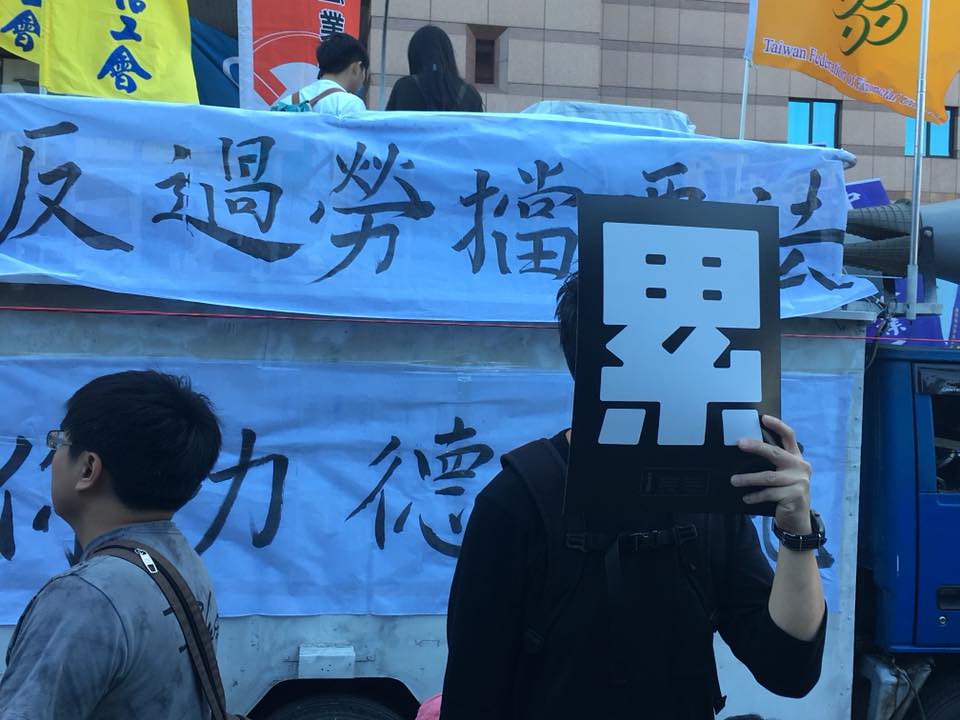
So, I pushed myself to go to today's labor protest even though I woke up this morning to the news that my grandfather had passed away (it was not a surprise).
Pushing myself to go anyway was a feat, but there is work to be done and I wanted to be one of the faces in that crowd helping to do it, even if all we were going to accomplish was media attention. After all, I live here and work here too and although the new labor laws don't affect me, Taiwan's generally terrible labor situation does affect me indirectly. Imagine, though, viewing a protest of roughly 10,000 people through a poorly-lit and echo-filled tunnel of unrelated personal grief.
I won't say that I went today as a journalist; I'm not one. I went as a demonstrator in a very conflicted state of mind who happened to plan to write about the experience.
I showed up just as the speeches were getting started and immediately grabbed one of the 'official' (in that everyone had one) protest placards. One side said "累" ("Tired") in Chinese, the other had a large graphic middle finger and said "終止過勞" ("End Overwork"). Almost every labor union I know - and some I didn't know existed - were there. Some were industry-related (e.g. the Taiwan Media Workers' Union), some business-specific (a Carrefour workers' union was present), some related to a specific kind of workers, such as foreign laborers who were quite noticeably present. Some, I noticed wryly, represented workers from government-run enterprises such as Taiwan Railways,
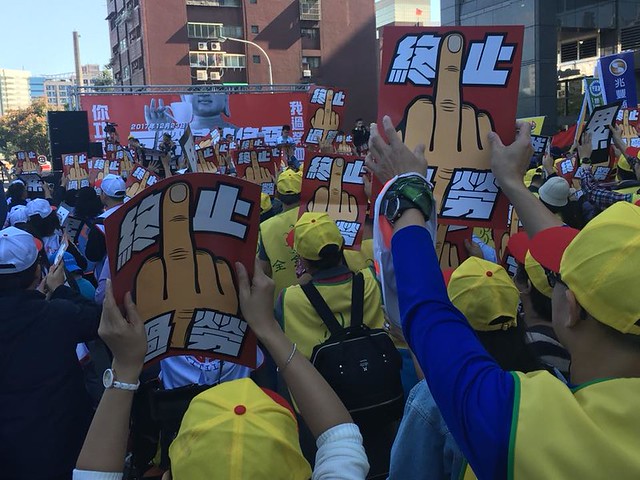
Also available were fake temple talismans on yellow paper, a reference to Premier Lai Ching-te saying that working hard for low wages was akin to earning "merit" (in the Buddhist/karma sense). Some people held placards showing a Pinocchio-like President Tsai, who is seen as having lied about the DPP's support for Taiwanese labor. Others held signs that looked like cassette tapes, a reference to a legislator saying all of the slogans being chanted outside were "on a tape" (something the pro-unification protesters - all 6 of them - regularly do) because the "real laborers were busy working hard at their jobs".
I didn't stay for the whole demonstration - which is actually still ongoing - but I stayed long enough to see some intense clashes between demonstrators and police over where the protest was "officially" allowed to be held. More on that later.
First of all, if there's any reason for hope, it's this: for the first time, foreign laborers were being brought into the fold and treated as equals alongside Taiwanese workers. They took the stage and had a translator (as the speaker used Bahasa Indonesia) relating their speech in Mandarin. For the first time that I'm aware of, labor from private and public industries came together, and had visible support from other social activist groups as well.
In fact, the Social Democratic Party, the Green Party, several marriage equality groups (including the Taiwan Tongzhi Hotline) and a Taiwan independence group holding signs saying "Fuck ROC" and passing out stickers saying "DPP KMT both are ROC", despite none of these issues being the main focus of the day.
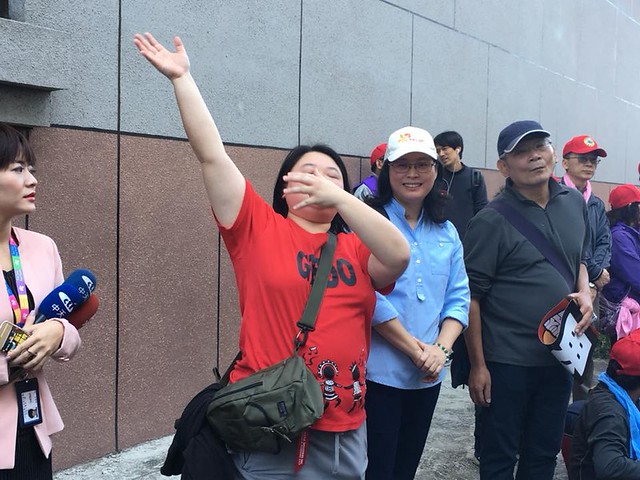 |
| Taipei Labor Bureau Commisioner Lai Hsiang-ling at the protest |
Along with the far left, the far right of the Taiwanese political scene was also there. Veterans showed up demanding the benefits they'd been promised, and at least one KMT legislator, Lee Yen-hsiu (李彥秀) was present giving interviews and generally pretending that the KMT gives a crap about labor (SPOILER ALERT: it doesn't). Apparently the NPP also declared its support, but oddly was not present. I fully intend to, um, inquire about this. Not cool, NPP.
This protest won't do much except garner media attention, but what I really hope comes of it is this - that these groups will continue to work together and turn labor issues into a major social movement with broad and active support. This sort of cross-pollination - marriage equality, Taiwan independence, migrant workers' rights, leftists and rightists, government workers and private-sector workers - is needed for a movement to gather momentum.
Several speeches, as well as several people I talked to in the crowd, noted that the DPP is no better than the KMT. While I do think people hold the DPP to a much higher standard than the KMT and that's not always fair - the KMT can get away with being supremely awful, and yet they're still around and still sometimes get elected whereas everyone jumps all over the tiniest slip by the DPP - that's to be expected when one party grew out of a mass-murdering dictatorship it doesn't seem too contrite for having perpetrated, and the other had idealistic roots based in freedom and democracy. You expect more from the people who claim to be better.
That said, on labor issues, and frankly on a lot of domestic issues, I have to say that they deserve the criticism. I'm generally happy with the way the DPP is handling China, but they're sure making a mess out of Taiwanese domestic issues, labor included. All I can really say is that they inherited a massive KMT mess to clean up, and the main problem is that they haven't got a clue how to do it. So they suffer for their own mistakes - which is well-deserved punishment - as well as the KMT's, which isn't.
Remember, we wouldn't even be in this labor mess if the KMT had given a damn about labor during their many, many, many, many years in power.
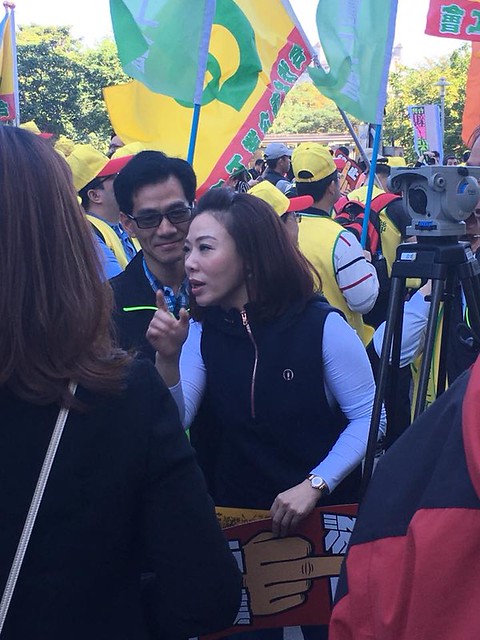 |
| KMT legislator Lee Yan-xiu at the protest |
In fact, I wonder if this is why the NPP - which seems pro-dual-nationality for (some) foreign professionals, but is not in favor of relaxing restrictions on foreign professionals and certainly not a great friend to foreign blue-collar labor - didn't show. Hmm. NPP, I luv you guyz, but come on. You're losing me here.
In any case, two things I noticed about foreign laborers at the rally: first, that they mostly wore surgical masks (unlike most Taiwanese workers there) because they were afraid of being identified and fired, a point explicitly made in their speech. Second, that while Taiwanese workers were fighting to have fair labor laws, the foreign workers were in some cases fighting to have the labor laws apply to them at all: many of those present held signs demanding that foreign care workers be included under Taiwanese labor protections, which they currently are not.
The airline, telecom and railway workers also interested me: as they pointed out in their speeches, their bosses are the government, and yet these new labor laws will screw them over, too.
Not everyone in the government is blind to this: the Taipei City Labor Bureau commissioner, Lai Hsiang-ling (賴香伶) marched with protesters in solidarity.
After listening to all of these speeches and chanting the usual anti-government slogans, we walked from DPP headquarters to what we thought was going to be the Legislative Yuan. On the way, I saw a marriage equality sign that said (in Chinese) "We can't get married but no matter - home, life, all not given". I quipped to a friend, "I'm surprised nobody has a sign that says "the birthrate is so low because nobody has time to fuck!" He replied that, in fact, someone on stage had said that (I missed it - I miss a lot, what can I say) but there was no sign. Too bad.
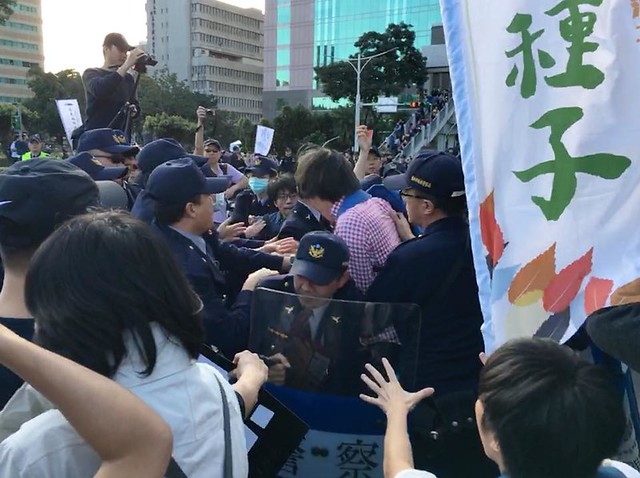 |
| Clashes with police |
I noticed something I hadn't seen before - though it is possible they have always been there and I just hadn't taken note: police cameras. Every few yards, one of the police officers watching the march was filming it.
When we hit Zhongshan and Zhongxiao Roads, however, a line of police appeared and would not let us continue up Zhongshan - trying to force the crowd to instead walk west, past Taipei Main Station. Organizers asked the crowd not to do that, as the route they'd applied for had them going up Zhongshan Road, whereas the police said they were not allowed.
There are conflicting reports of what exactly happened: the organizers were saying that the police were blocking an intersection that they had been approved to march through, with some commenting that this was to create conflict. Others say that the police announced the protest violated the Parade and Assembly Act and that was the reason for the blockade. Some say this was a ruse to simply stop the protest, as there was a possible intention to storm the Legislative Yuan (again...I suppose).
I don't buy either of these. Why would the police want to create conflict? Peaceful protests can be - and usually are - ignored. Protests that end in brawls grab media attention. Why do you think the KMT did exactly nothing to stop - nor to answer the demands of or even acknowledge - the old DPP-led protests during the Ma administration?
In terms of the second, with legislators and high-profile government employees there, and with it having been all over Facebook for weeks, there is no way this march "violated" any laws. Come on.
In any case, the protesters started chanting "police let us through!" and several intense clashes broke out, though nobody appeared to be seriously hurt (I was right there for one of them).
Finally, the police gave way after several attempts to push through, and the intersection - one of Taipei's largest and busiest - was occupied.
Here's my pet theory as to what happened:
By virtue of it being at Zhongshan and Zhongxiao Roads, the protest stopped outside of the Executive, not Legislative, Yuan. Apparently - according to a friend - a meeting was being held in there at that time. In any case, it was so heavily blockaded and surrounded with barricades and barbed wire that there was a clear government fear of an attempt to storm it.
UPDATE: the forced move into the intersection was, according to one of the organizers, an intentional move by the rights groups to start a conflict.
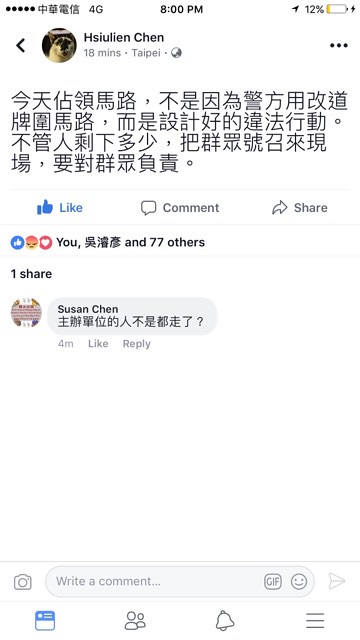
What resulted was an occupation of a major intersection - garnering more media attention than any of the previous labor protests, possibly the most since the 200,000-strong marriage equality rally - that is still ongoing. There are still clashes with police as people attempt to storm the Executive Yuan (see?) and apparently the police, according to a friend, are starting to look 'ready'.
I left around 4pm, because frankly, I lost my grandpa this morning. It was time to go and take care of my own headspace.
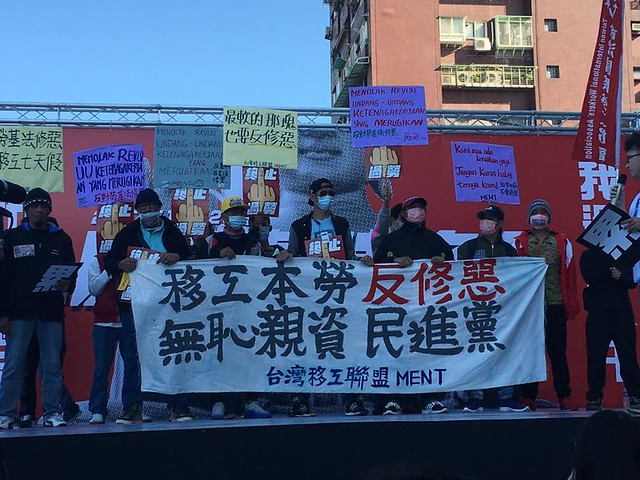 |
| Migrant workers are afraid to show their faces for fear of retribution from their employers |
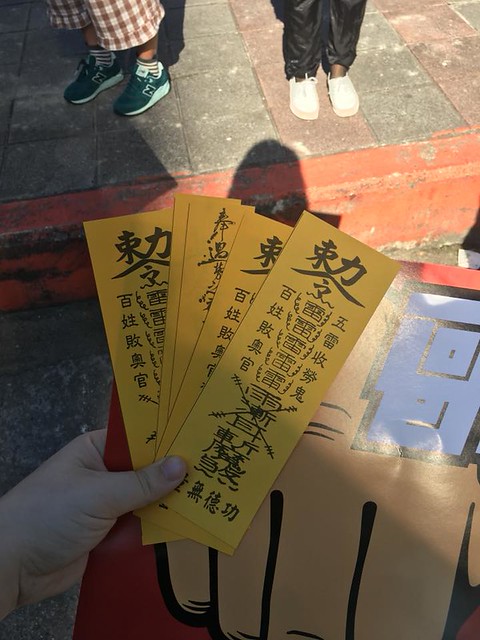 |
| Fake temple talismans mocking Premier Lai's comment about low pay earning "merit" |
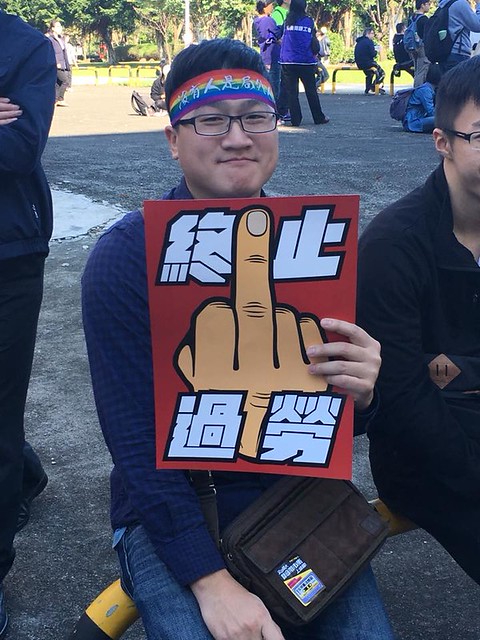
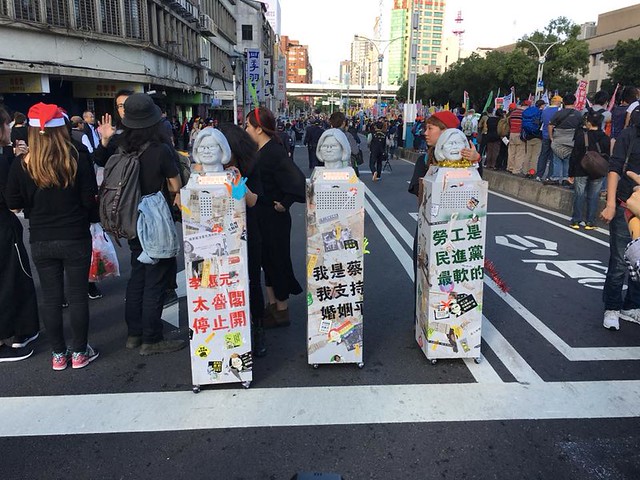 |
| "You can abuse President Tsai!" the people who set these up told me helpfully. She makes noise if you slap her. |
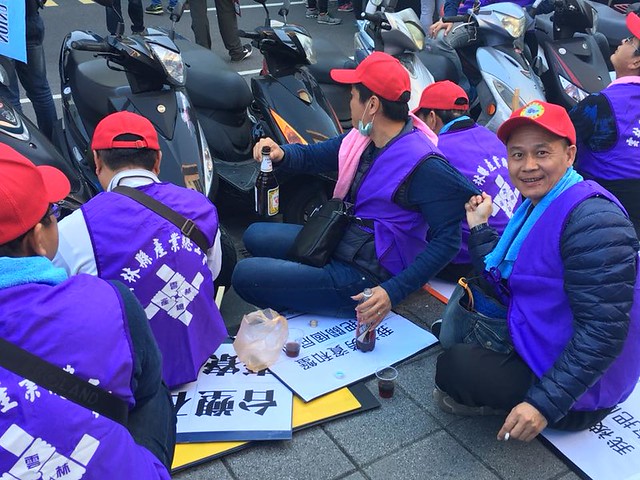 |
| Is there anything more Taiwanese than a bunch of workers in nylon vests drinking Wisbih (or is it Man Niu?) at a protest? |
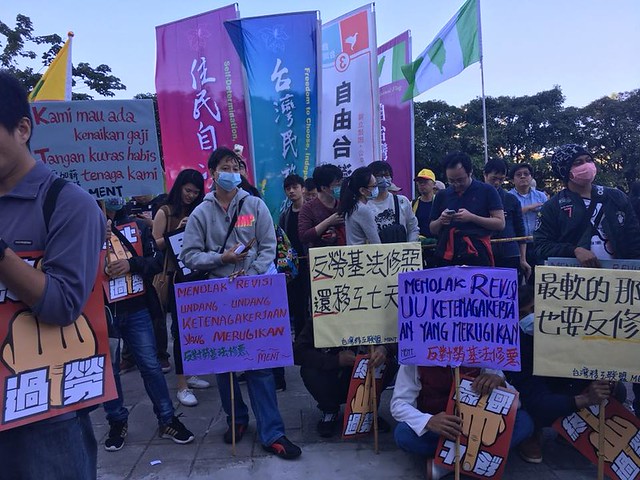 |
| More migrant workers |
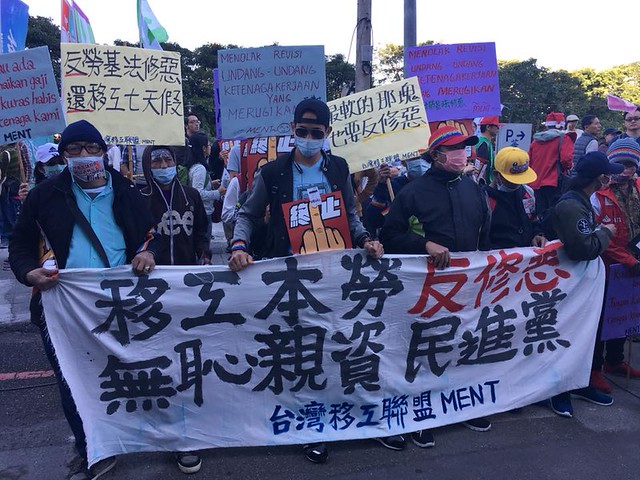
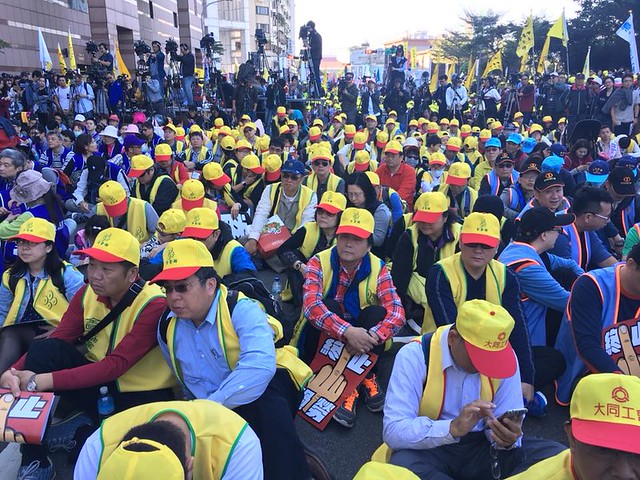
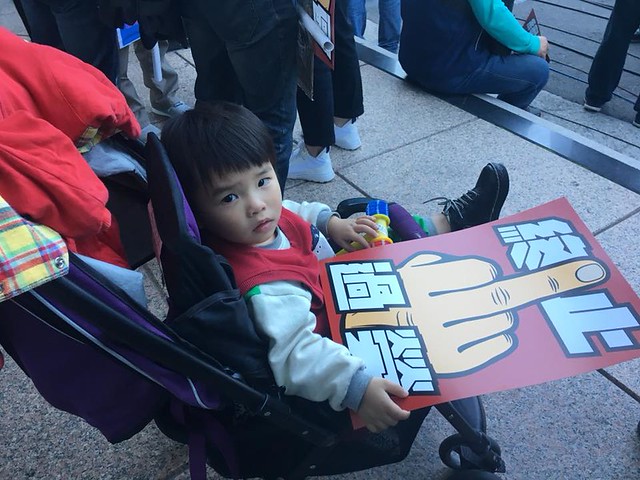 |
| Although there were kids at the protest, I got the feeling it was much angrier and more visceral than typical family-friendly Taiwanese demonstrations |
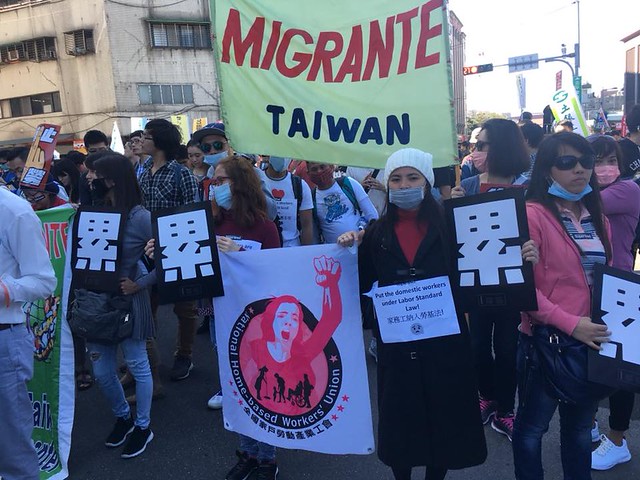
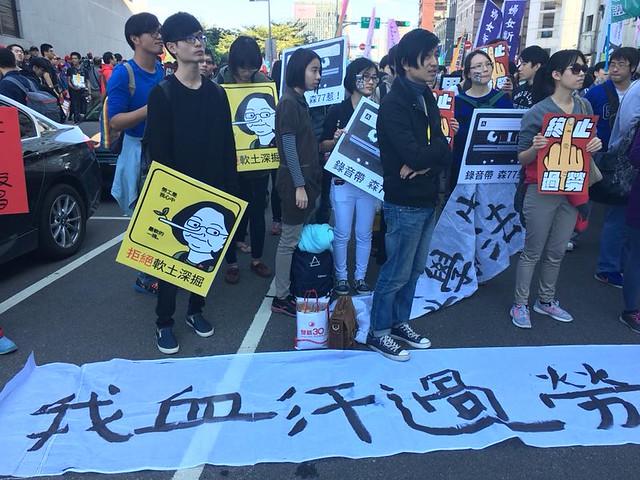
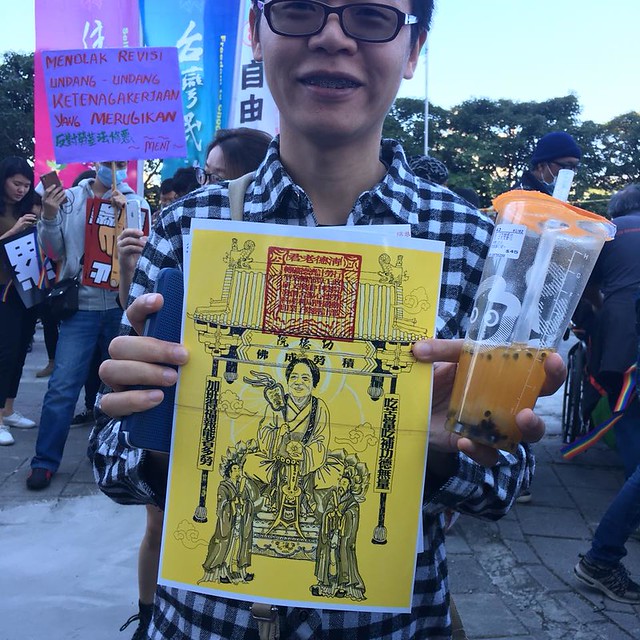
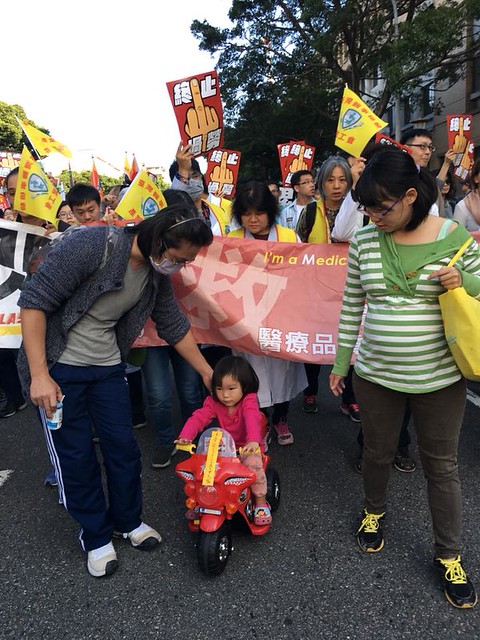
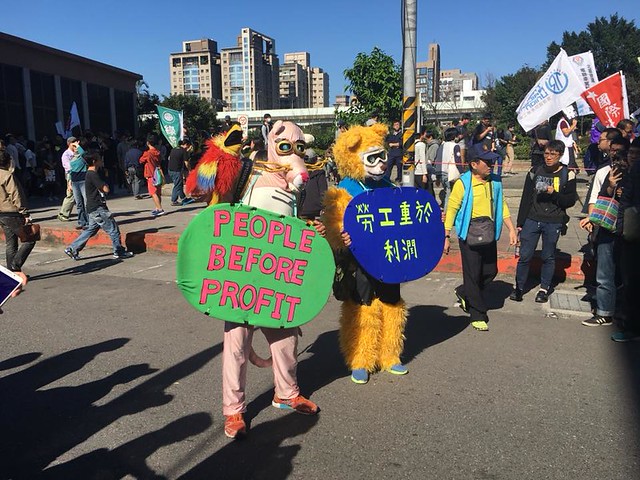 |
| My favorite protesters, every time |
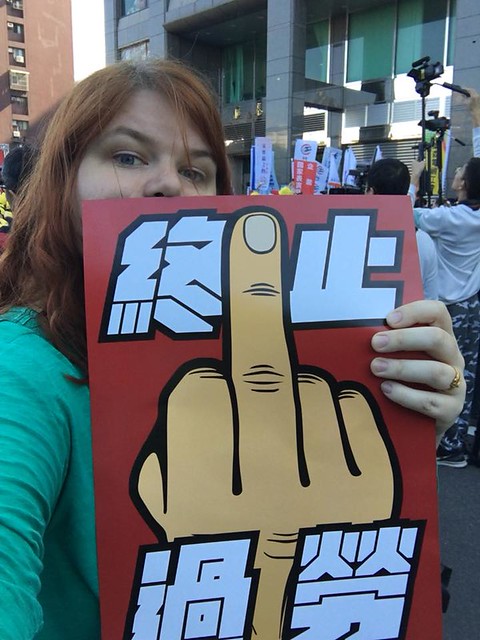
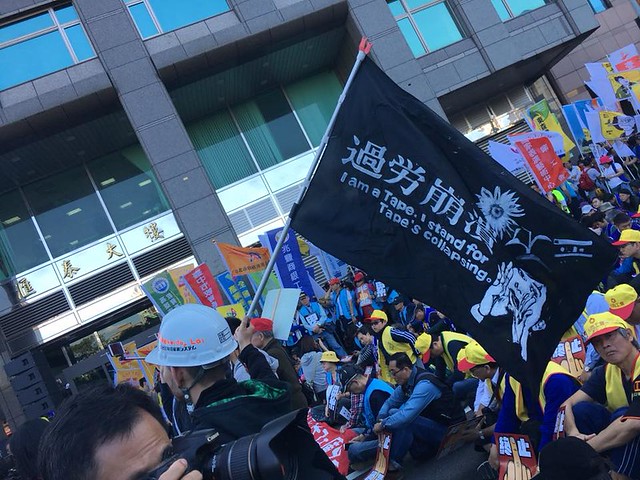
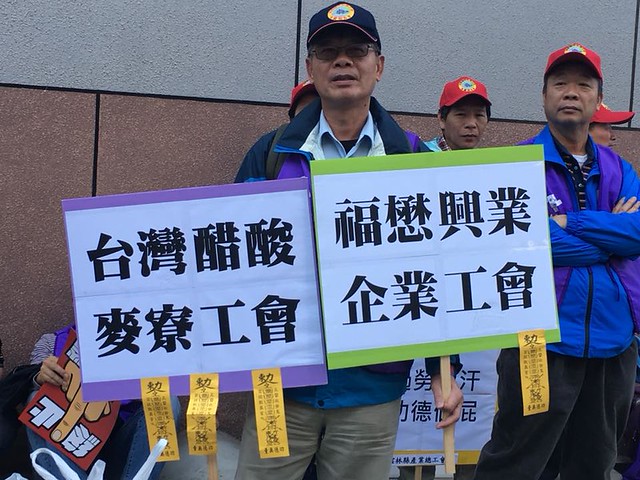
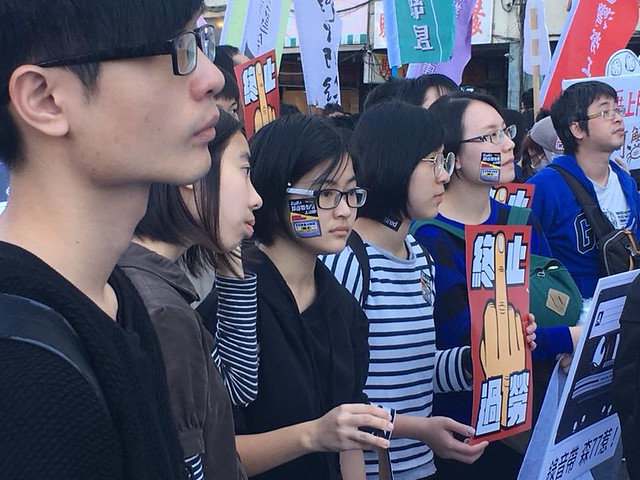
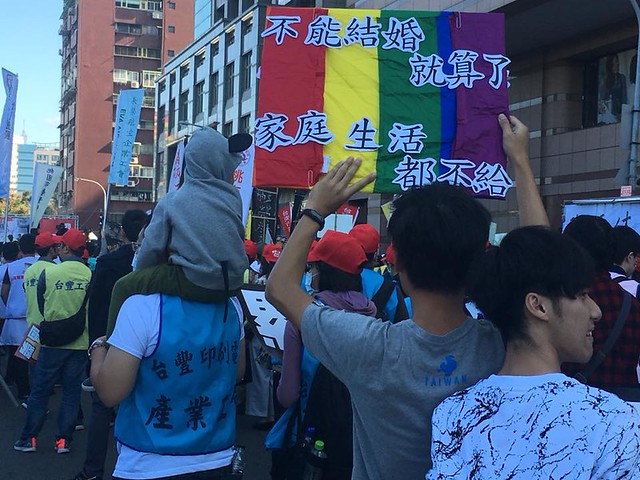
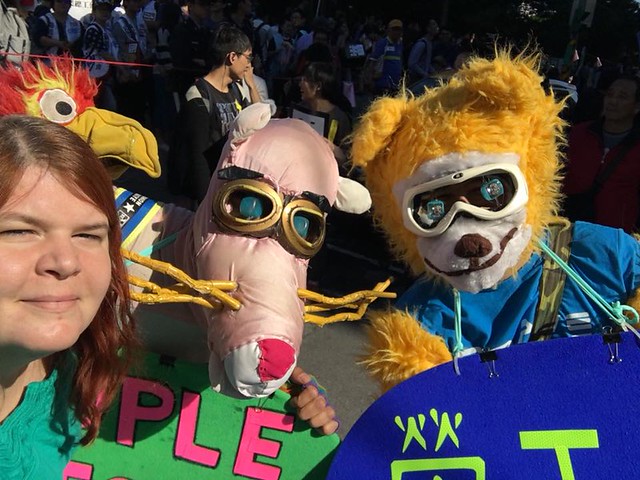
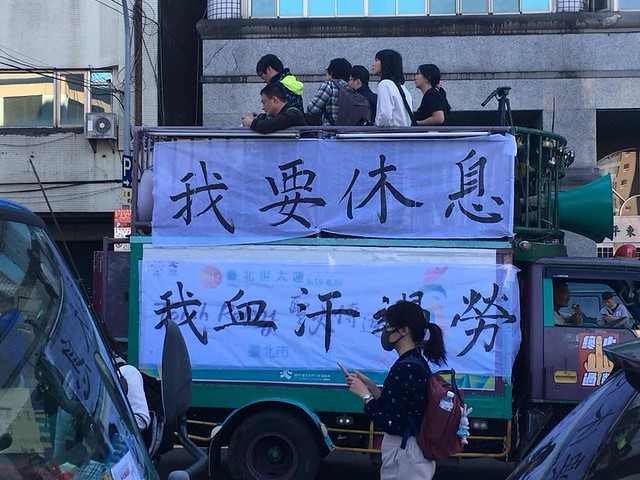
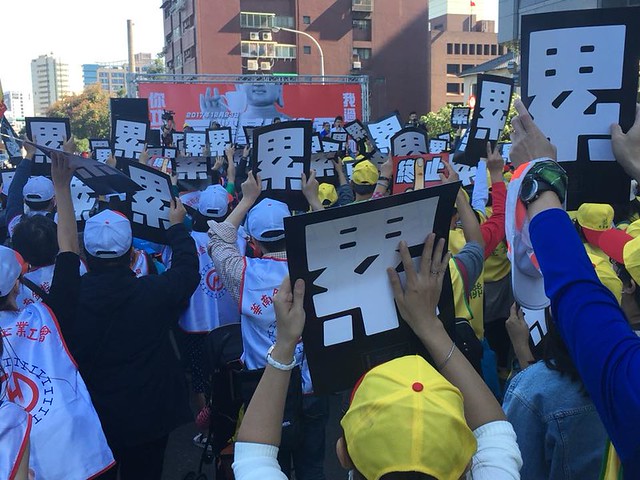
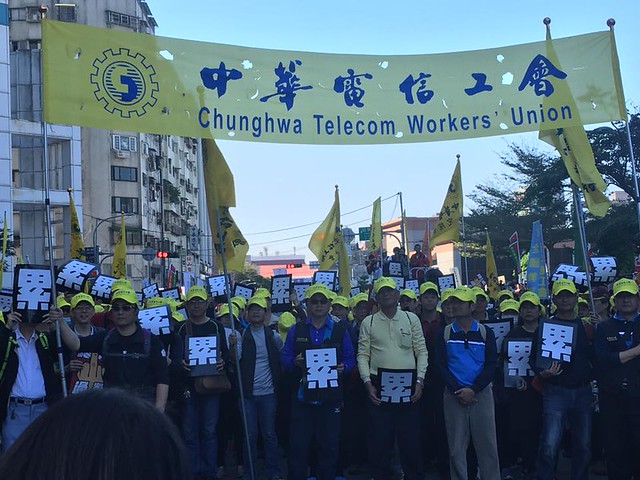 |
| Even government workers are upset |
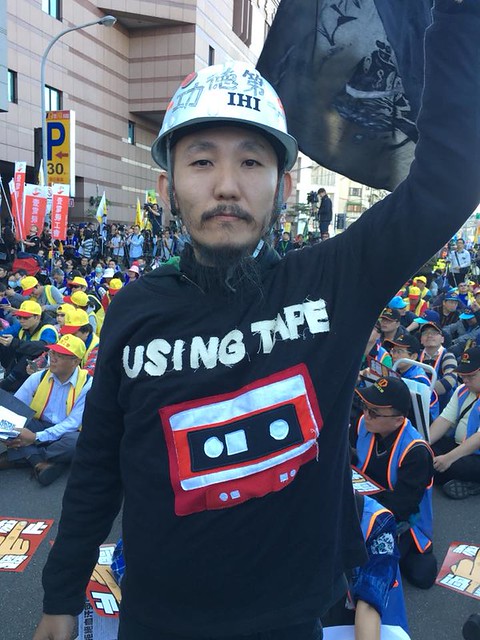 |
| A reference to the "the slogans are taped" comment by one legislator |
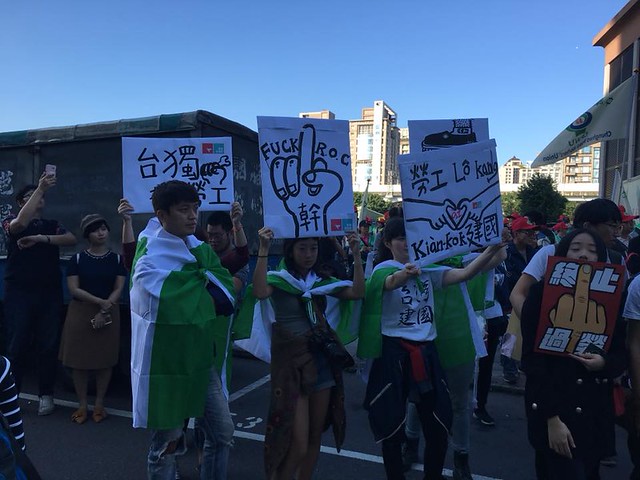 |
| Lots of different groups came together |
Tuesday, December 19, 2017
Losing losers who lose
Look, I could say a lot about the Huang Kuo-chang recall vote.
I could point out, as New Bloom did, that twice as many people mobilized to vote against him (though ultimately not enough) as those who came to vote for him. Okay, yeah, that's true, but honestly the push was against him - that side was always going to get more people out on Let's Vote For Something Stupid Day. Those who support him might just as well decided to stay home.
I could mention, as Frozen Garlic did, that this mess was partly the fault of Huang and the NPP themselves, for pushing for ridiculously low bars to make recalls happen. This is correct, but the point has already been made and, in any case, Huang survived. I have heard that despite this debacle he still believes in the idea of relaxed recall criteria, which kind of feels a bit Socrates-with-the-hemock-y, y'know?
I could bring up the issue that the failure of the vote seems to have mostly been reported in English by 'new media' - for example, the Taipei Times published pieces leading up to the recall, but doesn't seem to have anything on the recall itself (if it does, it's buried so deeply that I couldn't find it).
I could talk about the fragility of democracy, the difficulty elected representatives face knowing they might not be able to serve their entire terms, and how fringe groupsmight will use the recall laws to cause problems in the future. That's all fine, but ultimately a little obvious.
But you know what? I don't feel like it.
What I feel like saying is this:
Hey anti-gay losers - guess what? You're LOSERS! That's because you lost.
Your agenda is not welcome in Taiwan. Your hatred is uninspiring. People didn't come out to support your bigoted garbage recall vote. You are losing losers who lost.
Taiwan may still have a strong undercurrent of conservatism - certainly it's an issue among the older generations, as it is everywhere - but we've proven that that conservatism doesn't extend to American-style bigotry and discrimination. Taiwan is, in fact, better than that. Taiwan is the first Asian country to move towards marriage equality and I think will, despite delays, be the first Asian country to implement it. You lost.
This is because - nyah nyah nyah - you are losers.
You have some support, that's true. There are 40,000 or so bigots in Xizhi whom I'd like to flip off. But ultimately, not enough.
You could turn around and say "but you guys lost the 2012 elections and you will probably lose again someday". This is true. But those elections were between differing political ideologies which are tied to deep-set notions of identity and history, animated in part by powerful and wealthy interests that battle it out behind the scenes. In a two-party system such as this, each side will continue winning and losing in turn. At times, it seems to mean little.
Naw, your loss is far worse.
You asked for 66,000 or so people to show up to vote for hate - and they didn't. They woke up on Saturday, yawned, thought "nah, those guys are jerks" and poured a cup of coffee. They blew you off.
You wanted them to stand against equality, and not even in any way that would make any difference. Seriously, marriage equality is coming. If you'd unseated Huang out of some twisted sense of vindictiveness, it would still be coming. Huang is not the key to stopping it - it can't be stopped. You can't force a reversal of the highest court's decision.
You just wanted to do it to be jerks.
But you lost. They didn't come, because you are losers.
Taiwan is better than that, and it's better than you.
I could point out, as New Bloom did, that twice as many people mobilized to vote against him (though ultimately not enough) as those who came to vote for him. Okay, yeah, that's true, but honestly the push was against him - that side was always going to get more people out on Let's Vote For Something Stupid Day. Those who support him might just as well decided to stay home.
I could mention, as Frozen Garlic did, that this mess was partly the fault of Huang and the NPP themselves, for pushing for ridiculously low bars to make recalls happen. This is correct, but the point has already been made and, in any case, Huang survived. I have heard that despite this debacle he still believes in the idea of relaxed recall criteria, which kind of feels a bit Socrates-with-the-hemock-y, y'know?
I could bring up the issue that the failure of the vote seems to have mostly been reported in English by 'new media' - for example, the Taipei Times published pieces leading up to the recall, but doesn't seem to have anything on the recall itself (if it does, it's buried so deeply that I couldn't find it).
I could talk about the fragility of democracy, the difficulty elected representatives face knowing they might not be able to serve their entire terms, and how fringe groups
But you know what? I don't feel like it.
What I feel like saying is this:
Hey anti-gay losers - guess what? You're LOSERS! That's because you lost.
Your agenda is not welcome in Taiwan. Your hatred is uninspiring. People didn't come out to support your bigoted garbage recall vote. You are losing losers who lost.
Taiwan may still have a strong undercurrent of conservatism - certainly it's an issue among the older generations, as it is everywhere - but we've proven that that conservatism doesn't extend to American-style bigotry and discrimination. Taiwan is, in fact, better than that. Taiwan is the first Asian country to move towards marriage equality and I think will, despite delays, be the first Asian country to implement it. You lost.
This is because - nyah nyah nyah - you are losers.
You have some support, that's true. There are 40,000 or so bigots in Xizhi whom I'd like to flip off. But ultimately, not enough.
You could turn around and say "but you guys lost the 2012 elections and you will probably lose again someday". This is true. But those elections were between differing political ideologies which are tied to deep-set notions of identity and history, animated in part by powerful and wealthy interests that battle it out behind the scenes. In a two-party system such as this, each side will continue winning and losing in turn. At times, it seems to mean little.
Naw, your loss is far worse.
You asked for 66,000 or so people to show up to vote for hate - and they didn't. They woke up on Saturday, yawned, thought "nah, those guys are jerks" and poured a cup of coffee. They blew you off.
You wanted them to stand against equality, and not even in any way that would make any difference. Seriously, marriage equality is coming. If you'd unseated Huang out of some twisted sense of vindictiveness, it would still be coming. Huang is not the key to stopping it - it can't be stopped. You can't force a reversal of the highest court's decision.
You just wanted to do it to be jerks.
But you lost. They didn't come, because you are losers.
Taiwan is better than that, and it's better than you.
Sunday, November 19, 2017
Marriage equality is coming - so why are people still upset?
This isn't a rhetorical question, nor is it meant to imply that those who are unhappy at the seemingly slow pace of the Tsai administration on making marriage equality a reality should not be. It's a sincere question, and worth diving into.
First, a backgrounder: on May 24th, Taiwan's judiciary ruled that, as the Constitution of the Republic of China guaranteed equality for all citizens, that this must include marriage for all citizens, and therefore marriage equality must be allowed in Taiwan. However, instead of this ruling taking immediate effect, the court gave the government 2 years to enact a law addressing this, or amend the civil code. If they do not, after the two years are up (so, May 24 2019) the civil code will simply be interpreted to include both same-sex and opposite-sex couples.
The ruling was handed down six months ago, and so far the government has not taken action. A marriage equality bill was not included in legislation deemed a 'priority' by the Legislative Yuan in their current session, although newly-appointed PremierWatermelon William Lai has said that the a marriage equality bill will be filed by the end of the year and has vowed to "realize" same-sex marriage in Taiwan.
None of this should matter, in theory. The court has spoken and the legislators and Tsai could sit around with their thumbs up their butts and the result would be the same - if they don't act we get marriage equality anyway. In 18 months no less - not that long in the grand scheme of politics.
In fact, Frozen Garlic made the argument - and I largely agree - that the DPP is actually on our side when it comes to marriage equality (scroll down to find the relevant information in that link). They know that passing a civil code amendment is politically infeasible given that a large portion of their support are older southern pro-independence social conservative sore losers who know they've lost but don't want the civil code changed nonetheless. They also know that passing a law papering over the civil code won't please pro-equality activists who want to see a more fundamental change.
In fact, it's notable that the DPP legislators who are openly pro-marriage equality are almost entirely party list. Elected ones? Not so much.
So what is the DPP to do, considering these opposing forces and desire to stay in power? Nothing at all, perhaps, allowing the interpretation of the civil code to change while neither having to anger activists by passing an imperfect law, nor pissing off their more conservative supporters by proactively amending the code.
Thinking this way, you might even think they're on our side, and they might well be.
And yet, tensions are still running high and people are still unhappy with the government's lack of movement on the issue. Why? In less than 2 years they get what they want regardless.
There are a few reasons.
The first is that 18 months is a long time if the lack of equality affects you directly. People get sick and die in that time, and being married or not matters in terms of visitation, medical decisions and inheritances. or have life changes for which marriage matters to consider (for example, being offered a job abroad and wanting to bring their same-sex partner, but only being allowed to bring a spouse). I have one friend residing in Taiwan who recently married in the US, and is hoping to get his husband a marriage visa and residence permit. That is not possible until marriage equality is realized. That's quite a few visa runs at a not-insignificant expense. I have quite a bit of empathy for those whose lives are on hold despite the court ruling that Taiwan is a country that promises equality, because the government is not acting to implement the ruling. It sucks to be told "you have to wait for your basic human rights", even for just 18 months, and not even be sure at the end of that time what rights you will gain.
It stings even more to think that the reason why is because, if you are gay, some of your fellow countrymen do not fully support your equality, and the DPP is pandering to that. Their votes matter more than your humanity. It's politically pragmatic and therefore explicable - Tsai is their representative too, after all - and yet not necessarily forgivable if your life is directly affected by such political calculus. This is an idealistic take, and yet I have empathy. It's simply not persuasive to point out that this is what's happened: that's what loses progressive votes; it doesn't win them.
Another reason is simple worry over how "same-sex marriage" will shake out in reality. Note that I specifically did not say "marriage equality" here: if the government passes a law, LGBT Taiwanese are justifiably worried that the law will legalize same-sex marriage, but not necessarily grant equality. Same-sex marriage might well not be considered to include some of the benefits associated with opposite-sex marriage: the right to adopt and to fertility treatments/artificial insemination (currently not allowed for 'unmarried women', which same-sex female couples still technically are) are chief among these potential issues, but there are others.
However, similar questions will be raised if nothing is done by the 2-year deadline. If the civil code is simply interpreted to include same-sex marriage, how is that then interpreted in all specific details, including adoption, medical emergencies, inheritance, fertility treatment and other spousal rights?
This is understandably causing a lot of stress in the LGBT community, who can't be sure which option is better, as neither is ideal. Neither is an absolute guarantee not just of "same-sex marriage", but of full equality. There is worry that if social momentum pushing for marriage equality does not build again, that opponents will gain ground and full equality won't be realizable. These opponents are already going after legislators who support marriage equality as well as focusing on bogus, bigoted and frankly sexist "gender education" efforts in schools.
There is no clear solution here - if conservative blowback ensures that a proactive civil code amendment is not forthcoming, then there is nothing to do but stress out over which outcome might be worse.
There is also the sense that Tsai is, to put it bluntly, a coward or "people pleaser".
I don't necessarily agree with this, or rather, if she is a coward, this isn't the reason why (the nonsense regarding labor protections, however, is a different story).
I also don't see her as a people pleaser, given how many people she has actively displeased with her non-committal stance on marriage equality. She must be aware how many young progressives and LGBT Taiwanese are angry with her over what looks like more waffles than an Eggo factory. She and her party have likely concluded that it doesn't matter - it will happen anyway, the young progressives have no better alternative, and it's more important not to anger the southern conservatives.
However, I see the reasoning behind such vitriol.
If she is a coward on marriage equality, it's because the court ruling allowed her to be. She doesn't have to take a stand, because marriage equality will happen even if she takes none. This has given so many LGBT Taiwanese and other pro-equality activists a deeper sense of discomfort that she was given an escape hatch, a way out of having to make a tough decision, and so they doubt her.
If it really came to it, would she fight for us? If she had to? Or would she choose her more conservative voters over us, and over what's right?
We don't know, but given her muted response to LGBT activists between her inauguration and the May 24th ruling, I can't say with confidence that she would. Of course that makes those whose lives are affected by the wait for marriage equality nervous about her administration.
In fact, the lack of meaningful affirmative support for marriage equality - despite its being all but assured by the courts - is a part of the problem. Tsai (and the DPP) are not going to win the LGBT vote this way: "sure we sort of backed down on issues that affect you, but vote for us because the KMT is worse!" is simply not a winning message. Whether or not this is fair almost doesn't matter: it doesn't win votes. It's a stinker of a message, thoroughly unpersuasive.
Although the conservatives the DPP has to play to are perhaps more problematic than the moderates the Democrats tried to woo in 2016, they are making the same mistake: they're hoping a "sorry we didn't stand up for you more strongly but hey, the other guy is worse" message will win progressives in 2020. It didn't in the US in 2016 and it won't in Taiwan in 2020. Nor should it - the choice to play to your more conservative supporters may be politically calculated, but it does (and should) come with consequences.
Finally, I can imagine that many who threw their support behind her feel manipulated. Remember that during the campaign she came out as personally in favor of marriage equality, but never actually made that an official platform of the DPP or her campaign. That gave her the ability, technically, to then not push forward with it after her inauguration. After all, she never actually promised to.
However, she gave the strong impression that she not only wanted to, but would do so. To be let down on a technicality feels like manipulation to win young progressive votes, and to some extent it is. She must have known that we had faith in her and believed she would fight for us despite never making any concrete promises. Therefore, neither she nor any political observers can be surprised when we express disappointment at, if not "backtracking", her lack of responsiveness since taking office.
I do think Tsai is the best choice for 2020 (well, if she can quit throwing labor under the bus that is), and she is certainly better than another KMT princeling. If I could vote, I would vote for her. However, if I were gay, I am not so sure I could say that. I would feel too betrayed, too manipulated, too disappointed. If I were a gay Taiwanese voter, I am not sure there is a major party I could support at all.
In the end, I don't know what the way forward is. I want marriage equality to be realized in Taiwan before mid-2019. We can and should do better by those whose lives are directly affected by the current lack of rights. I want true equality, not simply same-sex marriage. I don't know how to best realize that, and perhaps the DPP's likely calculation is correct: allowing the civil code to simply be interpreted to allow same-sex couples to wed is the best way forward for all. Perhaps it will be easier to fight battles for full, true equality if we don't have to fight to amend an imperfect law, but rather for the civil code interpretation to include that equality.
Or perhaps it really would be too much of a mess to wait until 2019 and an imperfect law now is better than none at all. I don't know.
Perhaps we need better communication from the DPP - some assurance that they are, in fact, on our side and have decided that this is the best way to help us get what we want. I can understand how nervous LGBT people in Taiwan must be absent a strong affirmation of support from the ruling party.
This is not impossible: if they really do believe that waiting for the civil code interpretation to change is to the advantage of LGBT people in Taiwan, there is a good argument to be made there that could potentially help them retain the support of young progressives. Why aren't they making it? I want them to win in 2020, so I want them to communicate better.
They need a better message, a more persuasive one. I want them to create this message and it is frustrating that they are not doing so.
All I ask is that we continue to remember that, as we debate this issue from the safety of our relative privilege, that there are people whose real lives are affected by this, right now, across Taiwan.
We may not agree with their reasons for being upset, and we may not feel that way ourselves, but we need to remember that they are upset, and there is some justification for this. It may be hard to imagine that this is a stressful time for Taiwan's LGBT citizens and residents, given our recent victories. Yet it is. Remember that, despite marriage equality (or at least "same sex marriage") coming no matter what thanks to the courts, that LGBT people are waiting to see exactly how much "equality" the government will decide they get. Tempers are running high, but that's understandable. I'd be upset too.
First, a backgrounder: on May 24th, Taiwan's judiciary ruled that, as the Constitution of the Republic of China guaranteed equality for all citizens, that this must include marriage for all citizens, and therefore marriage equality must be allowed in Taiwan. However, instead of this ruling taking immediate effect, the court gave the government 2 years to enact a law addressing this, or amend the civil code. If they do not, after the two years are up (so, May 24 2019) the civil code will simply be interpreted to include both same-sex and opposite-sex couples.
The ruling was handed down six months ago, and so far the government has not taken action. A marriage equality bill was not included in legislation deemed a 'priority' by the Legislative Yuan in their current session, although newly-appointed Premier
None of this should matter, in theory. The court has spoken and the legislators and Tsai could sit around with their thumbs up their butts and the result would be the same - if they don't act we get marriage equality anyway. In 18 months no less - not that long in the grand scheme of politics.
In fact, Frozen Garlic made the argument - and I largely agree - that the DPP is actually on our side when it comes to marriage equality (scroll down to find the relevant information in that link). They know that passing a civil code amendment is politically infeasible given that a large portion of their support are older southern pro-independence social conservative sore losers who know they've lost but don't want the civil code changed nonetheless. They also know that passing a law papering over the civil code won't please pro-equality activists who want to see a more fundamental change.
In fact, it's notable that the DPP legislators who are openly pro-marriage equality are almost entirely party list. Elected ones? Not so much.
So what is the DPP to do, considering these opposing forces and desire to stay in power? Nothing at all, perhaps, allowing the interpretation of the civil code to change while neither having to anger activists by passing an imperfect law, nor pissing off their more conservative supporters by proactively amending the code.
Thinking this way, you might even think they're on our side, and they might well be.
And yet, tensions are still running high and people are still unhappy with the government's lack of movement on the issue. Why? In less than 2 years they get what they want regardless.
There are a few reasons.
The first is that 18 months is a long time if the lack of equality affects you directly. People get sick and die in that time, and being married or not matters in terms of visitation, medical decisions and inheritances. or have life changes for which marriage matters to consider (for example, being offered a job abroad and wanting to bring their same-sex partner, but only being allowed to bring a spouse). I have one friend residing in Taiwan who recently married in the US, and is hoping to get his husband a marriage visa and residence permit. That is not possible until marriage equality is realized. That's quite a few visa runs at a not-insignificant expense. I have quite a bit of empathy for those whose lives are on hold despite the court ruling that Taiwan is a country that promises equality, because the government is not acting to implement the ruling. It sucks to be told "you have to wait for your basic human rights", even for just 18 months, and not even be sure at the end of that time what rights you will gain.
It stings even more to think that the reason why is because, if you are gay, some of your fellow countrymen do not fully support your equality, and the DPP is pandering to that. Their votes matter more than your humanity. It's politically pragmatic and therefore explicable - Tsai is their representative too, after all - and yet not necessarily forgivable if your life is directly affected by such political calculus. This is an idealistic take, and yet I have empathy. It's simply not persuasive to point out that this is what's happened: that's what loses progressive votes; it doesn't win them.
Another reason is simple worry over how "same-sex marriage" will shake out in reality. Note that I specifically did not say "marriage equality" here: if the government passes a law, LGBT Taiwanese are justifiably worried that the law will legalize same-sex marriage, but not necessarily grant equality. Same-sex marriage might well not be considered to include some of the benefits associated with opposite-sex marriage: the right to adopt and to fertility treatments/artificial insemination (currently not allowed for 'unmarried women', which same-sex female couples still technically are) are chief among these potential issues, but there are others.
However, similar questions will be raised if nothing is done by the 2-year deadline. If the civil code is simply interpreted to include same-sex marriage, how is that then interpreted in all specific details, including adoption, medical emergencies, inheritance, fertility treatment and other spousal rights?
This is understandably causing a lot of stress in the LGBT community, who can't be sure which option is better, as neither is ideal. Neither is an absolute guarantee not just of "same-sex marriage", but of full equality. There is worry that if social momentum pushing for marriage equality does not build again, that opponents will gain ground and full equality won't be realizable. These opponents are already going after legislators who support marriage equality as well as focusing on bogus, bigoted and frankly sexist "gender education" efforts in schools.
There is no clear solution here - if conservative blowback ensures that a proactive civil code amendment is not forthcoming, then there is nothing to do but stress out over which outcome might be worse.
There is also the sense that Tsai is, to put it bluntly, a coward or "people pleaser".
I don't necessarily agree with this, or rather, if she is a coward, this isn't the reason why (the nonsense regarding labor protections, however, is a different story).
I also don't see her as a people pleaser, given how many people she has actively displeased with her non-committal stance on marriage equality. She must be aware how many young progressives and LGBT Taiwanese are angry with her over what looks like more waffles than an Eggo factory. She and her party have likely concluded that it doesn't matter - it will happen anyway, the young progressives have no better alternative, and it's more important not to anger the southern conservatives.
However, I see the reasoning behind such vitriol.
If she is a coward on marriage equality, it's because the court ruling allowed her to be. She doesn't have to take a stand, because marriage equality will happen even if she takes none. This has given so many LGBT Taiwanese and other pro-equality activists a deeper sense of discomfort that she was given an escape hatch, a way out of having to make a tough decision, and so they doubt her.
If it really came to it, would she fight for us? If she had to? Or would she choose her more conservative voters over us, and over what's right?
We don't know, but given her muted response to LGBT activists between her inauguration and the May 24th ruling, I can't say with confidence that she would. Of course that makes those whose lives are affected by the wait for marriage equality nervous about her administration.
In fact, the lack of meaningful affirmative support for marriage equality - despite its being all but assured by the courts - is a part of the problem. Tsai (and the DPP) are not going to win the LGBT vote this way: "sure we sort of backed down on issues that affect you, but vote for us because the KMT is worse!" is simply not a winning message. Whether or not this is fair almost doesn't matter: it doesn't win votes. It's a stinker of a message, thoroughly unpersuasive.
Although the conservatives the DPP has to play to are perhaps more problematic than the moderates the Democrats tried to woo in 2016, they are making the same mistake: they're hoping a "sorry we didn't stand up for you more strongly but hey, the other guy is worse" message will win progressives in 2020. It didn't in the US in 2016 and it won't in Taiwan in 2020. Nor should it - the choice to play to your more conservative supporters may be politically calculated, but it does (and should) come with consequences.
Finally, I can imagine that many who threw their support behind her feel manipulated. Remember that during the campaign she came out as personally in favor of marriage equality, but never actually made that an official platform of the DPP or her campaign. That gave her the ability, technically, to then not push forward with it after her inauguration. After all, she never actually promised to.
However, she gave the strong impression that she not only wanted to, but would do so. To be let down on a technicality feels like manipulation to win young progressive votes, and to some extent it is. She must have known that we had faith in her and believed she would fight for us despite never making any concrete promises. Therefore, neither she nor any political observers can be surprised when we express disappointment at, if not "backtracking", her lack of responsiveness since taking office.
I do think Tsai is the best choice for 2020 (well, if she can quit throwing labor under the bus that is), and she is certainly better than another KMT princeling. If I could vote, I would vote for her. However, if I were gay, I am not so sure I could say that. I would feel too betrayed, too manipulated, too disappointed. If I were a gay Taiwanese voter, I am not sure there is a major party I could support at all.
In the end, I don't know what the way forward is. I want marriage equality to be realized in Taiwan before mid-2019. We can and should do better by those whose lives are directly affected by the current lack of rights. I want true equality, not simply same-sex marriage. I don't know how to best realize that, and perhaps the DPP's likely calculation is correct: allowing the civil code to simply be interpreted to allow same-sex couples to wed is the best way forward for all. Perhaps it will be easier to fight battles for full, true equality if we don't have to fight to amend an imperfect law, but rather for the civil code interpretation to include that equality.
Or perhaps it really would be too much of a mess to wait until 2019 and an imperfect law now is better than none at all. I don't know.
Perhaps we need better communication from the DPP - some assurance that they are, in fact, on our side and have decided that this is the best way to help us get what we want. I can understand how nervous LGBT people in Taiwan must be absent a strong affirmation of support from the ruling party.
This is not impossible: if they really do believe that waiting for the civil code interpretation to change is to the advantage of LGBT people in Taiwan, there is a good argument to be made there that could potentially help them retain the support of young progressives. Why aren't they making it? I want them to win in 2020, so I want them to communicate better.
They need a better message, a more persuasive one. I want them to create this message and it is frustrating that they are not doing so.
All I ask is that we continue to remember that, as we debate this issue from the safety of our relative privilege, that there are people whose real lives are affected by this, right now, across Taiwan.
We may not agree with their reasons for being upset, and we may not feel that way ourselves, but we need to remember that they are upset, and there is some justification for this. It may be hard to imagine that this is a stressful time for Taiwan's LGBT citizens and residents, given our recent victories. Yet it is. Remember that, despite marriage equality (or at least "same sex marriage") coming no matter what thanks to the courts, that LGBT people are waiting to see exactly how much "equality" the government will decide they get. Tempers are running high, but that's understandable. I'd be upset too.
Wednesday, November 1, 2017
Rebels, Riffraff and Rights
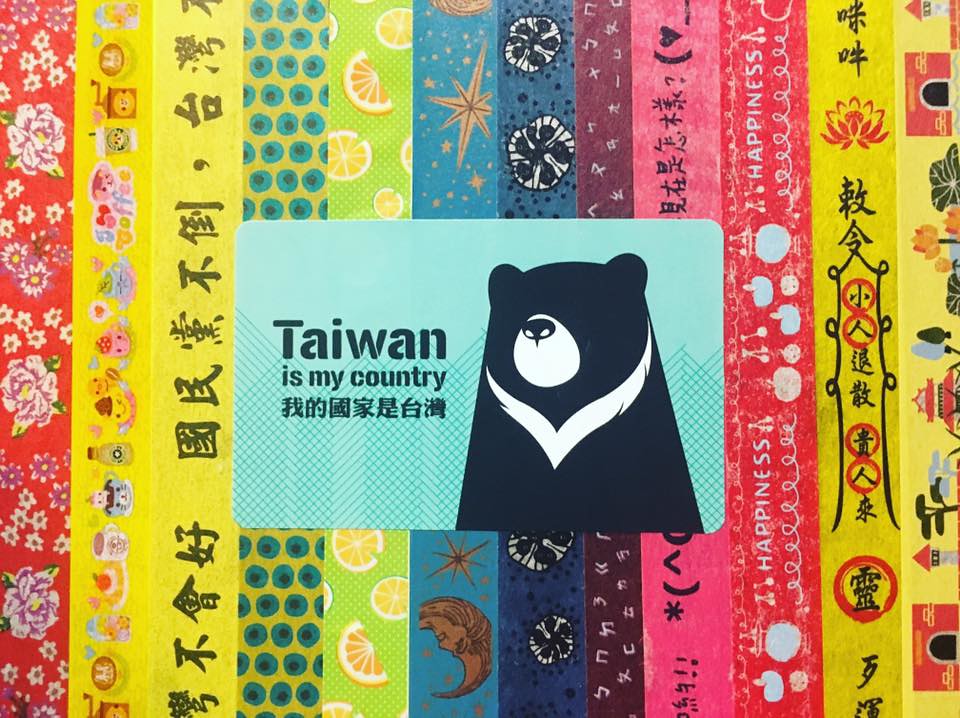
Last December, around 10,000 pro-LGBT people gathered outside the Legislative Yuan as hearings were held within to discuss proposed marriage equality legislation. I was there just to lend my support, and ran into a friend/former student who was also there in support of the bill. A few weeks later, we met again and were discussing the Sunflower Movement.
"Do you think it succeeded?" I asked.
"Actually not really," he replied.
"Why do you think so?" I continued.
He said that only one of the four demands of the Sunflowers was agreed to (the passage of a cross-strait monitoring framework before the CSSTA could be passed, and not even that had actually been implemented, whereas the CSSTA was not quite dead), and although the KMT had been kicked to the curb in the elections earlier that year, that was no guarantee of real change.
This was a good point, but I challenged him:
"It's true that the Sunflower demands were not really met, but I can tell you today's Taiwan is not the Taiwan I moved to in 2006. It's not even the Taiwan I knew in 2013. Something changed because of the Sunflowers, there's been a shift in public discourse and attitudes - it really woke the country up. People care more now than they used to, and their newfound activism is directly linked to being inspired by the Sunflowers. That means something."
"Yeah, but..."
"The other day at the rally, you weren't really out there in the crowd. I was. A lot of people were wearing Fuck The Government t-shirts, or even carrying sunflowers. It was clear that the movement had an effect on them. I don't know if they would have been there if they hadn't been woken up."
"Hmm," was all he said in reply.
* * *
On the heels of a record-breaking Taipei Pride parade (123,000 people were said to have attended this year, up from last year's estimated 80,000), Ketagalan Media - an organization I occasionally write for - published a strong backgrounder on the history and development of LGBT rights and marriage equality movements in Taiwan. They were right to link the relative success of equality movements here to Taiwanese civic activism in general, and a need or urge to differentiate Taiwan from China, a point which isn't made often enough.
However, although I think it makes some good points and covers some important angles, especially for those who may not be intimately familiar with the history of Taiwanese identity, I actually think that the piece inaccurately portrayed the causality of the issue.
Despite my story above, I would not say that the LGBT acceptance and marriage equality movements were offshoots of general civic activism in Taiwan. I don't see it entirely as a direct result of, say, the Sunflowers.
Rather, I would say that Taiwan has always had a more openminded or progressive bent than much of the rest of the continent, with a long historical tradition of civic activism and fighting for human rights. The Sunflowers did not come out of nowhere: they were a continuation of the same cultural traits that brought about the Qing-era rebellions, revolts and home-rule movements under the Japanese and the fight against dictatorship in the 20th century which was composed of several social movements.
As I see it, this rich history was borne of a culture perhaps not quite as beholden to Confucianism as the writer implies. That’s not to say Taiwanese culture is not influenced by Confucian thought: of course it is, to some extent. But remember how Taiwanese society came to be. There are Austronesian cultural roots in which Confucianism has no place, and in which women enjoyed higher status than in much of China (the role of women in Confucianism is, frankly, tragically unsuited to modern society). Added to that, immigrants from China first enticed to come to Taiwan by the Dutch and then, under the Qing, of their own volition (despite this being illegal for a good portion of Qing rule of Taiwan). What person happy with their role in society picks up their life to move to a wild, jungle-covered island, whether at the behest of a bunch of pasty foreign Red Hairs or simply because they want to, even when they are technically not allowed? How traditionally Confucian could the thinking of such a person be, leaving their family home and going against the edicts of their emperor, where Chinese women were not allowed (for some time) and where indigenous women held a higher status in local society than the women they were leaving behind?
That is to say, these early immigrants were often rebels, drifters, weirdos, adventurers, opportunists, riffraff (I would imagine there were more than a few petty criminals among them), pirates or simply people down on their luck.
This is not a criticism. This is praise. This is the foundation of a society that fights back, thinks for itself and is willing to stand up for what it wants. This is not a society of blind obedience, regardless of what notions you might have about ‘Asian cultures’. Give me these guys any day over people who do what they are told and in turn exert control over their wives and descendants. Perhaps it means Taiwan did not develop as peacefully as it could have, but peace is overrated if it doesn't come with justice.
To me, just living among the descendants of these people as well as the indigenous Taiwanese, I have come to understand that Confucianism plays a role in Taiwanese society but is not the key driver that people often assume it is (perhaps because they are predisposed to thinking that all East Asian societies live and die by that philosophy without thinking more deeply about it). In my experience, Daoism (the “everybody just chill” / “you do you” of ancient philosophies) as well as a healthy dose of just being people seeking the best possible life for themselves without worrying too much about the philosophical underpinnings of social order hold just as much, if not more, influence.
If anything, the Confucianism that does exist in Taiwan is arguably more tied to the relatively recent arrival and decades-long control of Taiwan by the KMT, a party very much bathed in the Confucian tradition and the main driver behind the Republic of China, which espouses a very Confucian-style government.
This interpretation of Taiwan’s cultural origins lends itself to a society more predisposed to accepting others as they are, at least outside of their family (within a family things get more complicated), and predisposed to rebelliousness (in a good way - not just accepting the government they are given but fighting actively for the government they want).
What I’m trying to say here is that If any Asian culture was going to be at the forefront of marriage equality and LGBT acceptance, it was going to be Taiwan. And if any Asian culture was going to be so civically engaged and fiercely defensive of a vibrant democracy that they themselves fought for and built, again, it was going to be Taiwan.
Both political activist/Taiwanese identity movements and the LGBT rights movement stem from this. One did not grow from the other: they sprang from the same origin. The success of LGBT acceptance and marriage equality activism in Taiwan - as compared to the rest of Asia - are because of something inherent to Taiwanese culture that is not typically associated with 'Asian cultures' (whether these stereotypical ideas of such cultures are fair or not - and I'd argue mostly not). Other activist movements are too, but they are more like twin siblings.
As I see it, this rich history was borne of a culture perhaps not quite as beholden to Confucianism as the writer implies. That’s not to say Taiwanese culture is not influenced by Confucian thought: of course it is, to some extent. But remember how Taiwanese society came to be. There are Austronesian cultural roots in which Confucianism has no place, and in which women enjoyed higher status than in much of China (the role of women in Confucianism is, frankly, tragically unsuited to modern society). Added to that, immigrants from China first enticed to come to Taiwan by the Dutch and then, under the Qing, of their own volition (despite this being illegal for a good portion of Qing rule of Taiwan). What person happy with their role in society picks up their life to move to a wild, jungle-covered island, whether at the behest of a bunch of pasty foreign Red Hairs or simply because they want to, even when they are technically not allowed? How traditionally Confucian could the thinking of such a person be, leaving their family home and going against the edicts of their emperor, where Chinese women were not allowed (for some time) and where indigenous women held a higher status in local society than the women they were leaving behind?
That is to say, these early immigrants were often rebels, drifters, weirdos, adventurers, opportunists, riffraff (I would imagine there were more than a few petty criminals among them), pirates or simply people down on their luck.
This is not a criticism. This is praise. This is the foundation of a society that fights back, thinks for itself and is willing to stand up for what it wants. This is not a society of blind obedience, regardless of what notions you might have about ‘Asian cultures’. Give me these guys any day over people who do what they are told and in turn exert control over their wives and descendants. Perhaps it means Taiwan did not develop as peacefully as it could have, but peace is overrated if it doesn't come with justice.
To me, just living among the descendants of these people as well as the indigenous Taiwanese, I have come to understand that Confucianism plays a role in Taiwanese society but is not the key driver that people often assume it is (perhaps because they are predisposed to thinking that all East Asian societies live and die by that philosophy without thinking more deeply about it). In my experience, Daoism (the “everybody just chill” / “you do you” of ancient philosophies) as well as a healthy dose of just being people seeking the best possible life for themselves without worrying too much about the philosophical underpinnings of social order hold just as much, if not more, influence.
If anything, the Confucianism that does exist in Taiwan is arguably more tied to the relatively recent arrival and decades-long control of Taiwan by the KMT, a party very much bathed in the Confucian tradition and the main driver behind the Republic of China, which espouses a very Confucian-style government.
This interpretation of Taiwan’s cultural origins lends itself to a society more predisposed to accepting others as they are, at least outside of their family (within a family things get more complicated), and predisposed to rebelliousness (in a good way - not just accepting the government they are given but fighting actively for the government they want).
What I’m trying to say here is that If any Asian culture was going to be at the forefront of marriage equality and LGBT acceptance, it was going to be Taiwan. And if any Asian culture was going to be so civically engaged and fiercely defensive of a vibrant democracy that they themselves fought for and built, again, it was going to be Taiwan.
Both political activist/Taiwanese identity movements and the LGBT rights movement stem from this. One did not grow from the other: they sprang from the same origin. The success of LGBT acceptance and marriage equality activism in Taiwan - as compared to the rest of Asia - are because of something inherent to Taiwanese culture that is not typically associated with 'Asian cultures' (whether these stereotypical ideas of such cultures are fair or not - and I'd argue mostly not). Other activist movements are too, but they are more like twin siblings.
That's not to say that civic activism in Taiwan hasn't influenced LGBT activism. As I pointed out to my friend, the Sunflowers were the catalyst of an awakening in Taiwan. Without that awakening the number of people actively fighting for marriage equality would likely be lower. The LGBT rights movement here has support from many straight, cisgender allies (myself included). This would still be the case even if the Sunflower Movement had never happened, but it’s unlikely that the crowds would be quite the same size. But, the movement would certainly still exist, just as it had done before 2014.
There are also ways that the Taiwanese identity movement and the LGBT acceptance and marriage equality movements diverge. Taiwanese identity is especially strong in rural Taiwan and the south, where support of the LGBT movement still struggles for support. This is a part of why, while the traditionally pro-independence DPP supports marriage equality somewhat more than the more traditionally China-oriented KMT, their support is not universal and is at times lukewarm: while there is a correlation, being pro-Taiwan does not automatically translate into being pro-marriage equality or accepting LGBT people for who they are (and yet tends to support social movements). And while the KMT tends to be more oriented towards a vision of Taiwan that is ultimately Chinese, with traditionally Chinese cultural roots that include Confucianism, and as a result less open to both social movements and LGBT acceptance, you will find supporters of marriage equality in their ranks.
That said, I do agree that in the modern Taiwanese identity movement, building a better country for its own sake, rather than defining Taiwan in terms of how it is not a part of China, is a key factor. A modern, international Asian nation in which everybody is accepted for who they are, ethnicity is not the key driver of what makes Taiwan unique, and everybody has equal rights (including LGBT people) is a part of that identity and, among the youth especially, is inextricable from it. To some extent, they do feed off each other. However, this feeding seems to be to be a mutual energy exchange, not of one "propelling" the other.
So, in the end, while there are a lot of good things to say about this article in terms of the background information on the history of Taiwanese identity and LGBT rights movements, and I agree with quite a bit of it, there are some areas where I feel it either gives too much credence to certain views of social order (i.e. Confucianism) and others where it assumes a causation that I’m not sure is entirely merited - inferring a parent/child-style relationship to Taiwanese identity and LGBT rights where I think a “two siblings” metaphor is more apt.
There are also ways that the Taiwanese identity movement and the LGBT acceptance and marriage equality movements diverge. Taiwanese identity is especially strong in rural Taiwan and the south, where support of the LGBT movement still struggles for support. This is a part of why, while the traditionally pro-independence DPP supports marriage equality somewhat more than the more traditionally China-oriented KMT, their support is not universal and is at times lukewarm: while there is a correlation, being pro-Taiwan does not automatically translate into being pro-marriage equality or accepting LGBT people for who they are (and yet tends to support social movements). And while the KMT tends to be more oriented towards a vision of Taiwan that is ultimately Chinese, with traditionally Chinese cultural roots that include Confucianism, and as a result less open to both social movements and LGBT acceptance, you will find supporters of marriage equality in their ranks.
That said, I do agree that in the modern Taiwanese identity movement, building a better country for its own sake, rather than defining Taiwan in terms of how it is not a part of China, is a key factor. A modern, international Asian nation in which everybody is accepted for who they are, ethnicity is not the key driver of what makes Taiwan unique, and everybody has equal rights (including LGBT people) is a part of that identity and, among the youth especially, is inextricable from it. To some extent, they do feed off each other. However, this feeding seems to be to be a mutual energy exchange, not of one "propelling" the other.
So, in the end, while there are a lot of good things to say about this article in terms of the background information on the history of Taiwanese identity and LGBT rights movements, and I agree with quite a bit of it, there are some areas where I feel it either gives too much credence to certain views of social order (i.e. Confucianism) and others where it assumes a causation that I’m not sure is entirely merited - inferring a parent/child-style relationship to Taiwanese identity and LGBT rights where I think a “two siblings” metaphor is more apt.
Sunday, June 18, 2017
Neither marriage equality nor Taiwanese independence are strange or scary - stop making them seem that way for clicks
As we all know, and the reasonable among us have celebrated, marriage equality is finally set to come to Taiwan. I personally do not think any of the worst fears of retaliation by anti-equality groups will come to pass, because the ruling was clear. Inequality is unconstitutional, therefore, there must be equality. Unequal laws passed off as "marriage equality" will not suffice and it seems to me will be open to immediate challenge in court.
You wouldn't know that from reading Taiwanese English-language media though.
Have a read through these articles, or even just check their headlines:
Same-sex marriage age to be set at 18
Cabinet mulls introducing marriage age of 18 for same-sex couples
What's your first impression upon skimming the headlines? Was it that the marriage age for same-sex couples seems like it will be different (and older) than that currently set for opposite-sex ones?
Look again at the first paragraphs (or first few paragraphs) of each:
In fact, in the middle or at the bottom - not in the headline, not at the top - of both articles, it is clarified that the marriage age for heterosexual couples is proposed to change too, so that the age regulations will be the same no matter the sex(es) of the couple:
Chen said that the Cabinet would recommend that the legal age at which heterosexual couples can be engaged be changed to 17 so that the rules would be consistent.
* * *
Although Taiwan's Civil Code currently has a different minimum age requirement for men and women in heterosexual unions, the Executive Yuan's proposed legal amendment would make the minimum engagement and marriage age the same for homosexual and heterosexual unions, Cabinet secretary general Chen Mei-ling (陳美伶) said during a meeting.
I understand why Taipei Times and Focus Taiwan did this: marriage equality is a hot issue, and articles about it get clicks. Articles on changing the marriage age are less likely to be read - marriage age changes, especially fairly small ones, are just not that interesting. You can basically get what you need to know from the headline.
It's the same rationale behind why China seems to be horned into every single article (even headline) in the international media about Taiwan, even when it isn't in any way relevant. So we end up with stupid headlines like Tsai Ying-wen elected president of Taiwan, China angry or China likely to be upset about marriage equality in Taiwan? (I made those up, but they're pretty close to the truth). China gets clicks, Taiwan doesn't, so editors complicit in mutilating Taiwan's story in the international press shove China in there like an unlubed butt plug.
And I know this is why they do it because more than one journalist friend has told me so. They *shrug* and say "it's better that the article be published at all than it be spiked because nobody's going to read about just Taiwan." Quite literally if you want to be in the news at all you have to bend over and take it.
So it is with marriage equality, except it doesn't even come with the excuse of "if you want this news out there at all you have to accept the butt plug" that the China-shoving does. It's just put in there to be sensationalistic and get clicks over what is a relatively minor news item, which deserves to be published but maybe wasn't going to get all that many clicks anyhow...and that's okay for something that, again, is just not that interesting. It's not serving any greater purpose.
It's just as damaging domestically, however, as the China butt-plugging is internationally, if it's also happening in the Chinese-language media (it probably is, but I'm traveling right now and don't have the time to properly check. Some back-up on this would be greatly appreciated).
What articles like these do is make marriage equality seem riskier, stranger, scarier, more sensational and more 'exotic' than it really is by highlighting what the rules are likely to be for same-sex unions while downplaying that the proposals would make these rules the same for opposite-sex couples. It damages the idea of marriage equality as a step forward in human rights, in a greater application of equality for all, and, frankly, as something normal, even mundane - which it more or less has become in much of the developed world. The ruling was a big deal. Marriage equality coming to Taiwan is a big deal. Setting the marriage age and proposing to change the heterosexual marriage age to be consistent is not. Continuing to treat marriage between people of the same sex as somehow different from marriage between people of the opposite sex encourages readers to think that way, and confirms the biases of those who already do. It's not neutral and it's barely accurate.
It's not that much different from the international (and sometimes domestic) press playing up every single tremor of disapproval from China, presenting their statements without context, making everything seem more terrifying or unprecedented than it really is, instead of accurately reporting the truth on the ground, which is rather mundane: Taiwan is independent, China doesn't like that, but China can fuck right off and so far not much has really changed. It is not neutral, barely accurate (or not accurate at all), creates sensationalism and otherness where none need exist, encourages a certain thought process, and plays to biases for those who already have them. It hurts Taiwan in the same way that writing about marriage equality this way is detrimental to a broader acceptance of equality.
Going back to marriage equality, what's worse is that there does seem to be at least one problematic proposal on the table that, from the reporting, would seem to affect opposite-sex couples but not same-sex ones. From the Taipei Times article:
Same-sex couples younger than 20 who want to get married must obtain the approval of their legal guardians, or the marriage could be voided should their legal representatives file an objection, she [Chen Mei-ling] said.
This is buried about halfway down one article and not mentioned in another, and yet to me it appears to be the real news item here - unless this proposal would cover all couples equally, it is a sign that the Executive Yuan is mulling a rule that would create unequal marriage laws, which, as I've said several times, will be open to all sorts of challenges as the ruling is unambiguous in calling for equality.
But neither Focus Taiwan nor Taipei Times can seem to get their heads out of 'what'll get the most clicks' land and report actual news.
You wouldn't know that from reading Taiwanese English-language media though.
Have a read through these articles, or even just check their headlines:
Same-sex marriage age to be set at 18
Cabinet mulls introducing marriage age of 18 for same-sex couples
What's your first impression upon skimming the headlines? Was it that the marriage age for same-sex couples seems like it will be different (and older) than that currently set for opposite-sex ones?
Look again at the first paragraphs (or first few paragraphs) of each:
The Executive Yuan yesterday said that its proposal to legalize same-sex marriage would set the legal age for such unions at 18 and engagement at 17, while prohibiting those within the sixth degree of consanguinity from getting married.
The Cabinet held a second ad hoc meeting to establish the goals that it is to work toward in the legislative process to legalize same-sex unions.
After reviewing the chapter in the Civil Code governing marriage, the Executive Yuan said that homosexual couples would have to be at least 18 to get married and at least 17 to become engaged, Executive Yuan Secretary-General Chen Mei-ling (陳美伶) told a news conference in Taipei.
The Civil Code stipulates that heterosexual couples must be at least 18 to be legally united and at least 16 to be engaged.
* * *
Taipei, June 14 (CNA) The Executive Yuan is considering making the minimum age at which same-sex couples can get engaged and marry 17 and 18 respectively, irrespective of gender, a Cabinet official said on Wednesday.
In fact, in the middle or at the bottom - not in the headline, not at the top - of both articles, it is clarified that the marriage age for heterosexual couples is proposed to change too, so that the age regulations will be the same no matter the sex(es) of the couple:
Chen said that the Cabinet would recommend that the legal age at which heterosexual couples can be engaged be changed to 17 so that the rules would be consistent.
* * *
Although Taiwan's Civil Code currently has a different minimum age requirement for men and women in heterosexual unions, the Executive Yuan's proposed legal amendment would make the minimum engagement and marriage age the same for homosexual and heterosexual unions, Cabinet secretary general Chen Mei-ling (陳美伶) said during a meeting.
I understand why Taipei Times and Focus Taiwan did this: marriage equality is a hot issue, and articles about it get clicks. Articles on changing the marriage age are less likely to be read - marriage age changes, especially fairly small ones, are just not that interesting. You can basically get what you need to know from the headline.
It's the same rationale behind why China seems to be horned into every single article (even headline) in the international media about Taiwan, even when it isn't in any way relevant. So we end up with stupid headlines like Tsai Ying-wen elected president of Taiwan, China angry or China likely to be upset about marriage equality in Taiwan? (I made those up, but they're pretty close to the truth). China gets clicks, Taiwan doesn't, so editors complicit in mutilating Taiwan's story in the international press shove China in there like an unlubed butt plug.
And I know this is why they do it because more than one journalist friend has told me so. They *shrug* and say "it's better that the article be published at all than it be spiked because nobody's going to read about just Taiwan." Quite literally if you want to be in the news at all you have to bend over and take it.
So it is with marriage equality, except it doesn't even come with the excuse of "if you want this news out there at all you have to accept the butt plug" that the China-shoving does. It's just put in there to be sensationalistic and get clicks over what is a relatively minor news item, which deserves to be published but maybe wasn't going to get all that many clicks anyhow...and that's okay for something that, again, is just not that interesting. It's not serving any greater purpose.
It's just as damaging domestically, however, as the China butt-plugging is internationally, if it's also happening in the Chinese-language media (it probably is, but I'm traveling right now and don't have the time to properly check. Some back-up on this would be greatly appreciated).
What articles like these do is make marriage equality seem riskier, stranger, scarier, more sensational and more 'exotic' than it really is by highlighting what the rules are likely to be for same-sex unions while downplaying that the proposals would make these rules the same for opposite-sex couples. It damages the idea of marriage equality as a step forward in human rights, in a greater application of equality for all, and, frankly, as something normal, even mundane - which it more or less has become in much of the developed world. The ruling was a big deal. Marriage equality coming to Taiwan is a big deal. Setting the marriage age and proposing to change the heterosexual marriage age to be consistent is not. Continuing to treat marriage between people of the same sex as somehow different from marriage between people of the opposite sex encourages readers to think that way, and confirms the biases of those who already do. It's not neutral and it's barely accurate.
It's not that much different from the international (and sometimes domestic) press playing up every single tremor of disapproval from China, presenting their statements without context, making everything seem more terrifying or unprecedented than it really is, instead of accurately reporting the truth on the ground, which is rather mundane: Taiwan is independent, China doesn't like that, but China can fuck right off and so far not much has really changed. It is not neutral, barely accurate (or not accurate at all), creates sensationalism and otherness where none need exist, encourages a certain thought process, and plays to biases for those who already have them. It hurts Taiwan in the same way that writing about marriage equality this way is detrimental to a broader acceptance of equality.
Going back to marriage equality, what's worse is that there does seem to be at least one problematic proposal on the table that, from the reporting, would seem to affect opposite-sex couples but not same-sex ones. From the Taipei Times article:
Same-sex couples younger than 20 who want to get married must obtain the approval of their legal guardians, or the marriage could be voided should their legal representatives file an objection, she [Chen Mei-ling] said.
This is buried about halfway down one article and not mentioned in another, and yet to me it appears to be the real news item here - unless this proposal would cover all couples equally, it is a sign that the Executive Yuan is mulling a rule that would create unequal marriage laws, which, as I've said several times, will be open to all sorts of challenges as the ruling is unambiguous in calling for equality.
But neither Focus Taiwan nor Taipei Times can seem to get their heads out of 'what'll get the most clicks' land and report actual news.
Thursday, May 25, 2017
First in Asia? I think so.
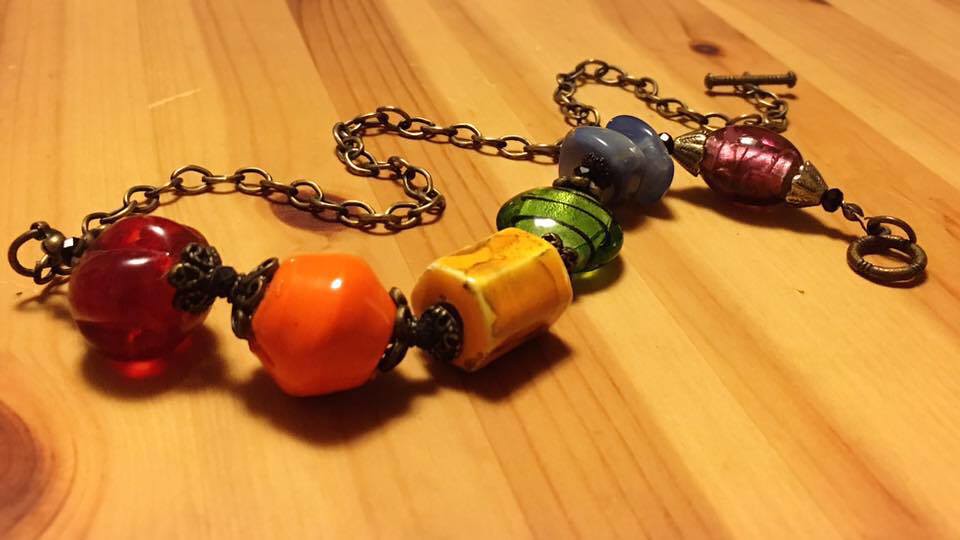
I have a habit of always being connected to things, but never quite being there when the big events happen. So it is again with the absolutely huge ruling from Taiwan's highest court stating that not allowing same-sex couples to marry was unconstitutional.
There are both good and problematic things about the ruling, but before we get into that, can we just take a minute to jump up and down and celebrate? This is HUGE. Let's just take a few minutes not to undercut that with doubts and rainclouds and just celebrate something good for a bit, 'k?
I mean it - I happen to not be in Taiwan right now, but before I could even get into the meat of this ruling, I immediately flicked off Airplane Mode upon landing at Heathrow (we have a connection to Athens that we're still waiting for), knowing the ruling would be out today, and went straight for the news. I was so happy to read those two three little words - "rules in favor" - that I started crying and jumping up and down on an escalator. Sometimes you've just got to be all holy crap holy crap oh my god holy crap congratulations Taiwan oh my god we did it we did it oh my god oh my god holy crap good job Taiwan wow wow wow wow WOW wow WOWWWW wowowowowowowowowow yayyyy!!! yayayayay yay yay yay YAY YAY YAY!!!!!
We've earned it. Celebrate, and don't feel bad about that. I am so proud to call Taiwan my home today. Good job.
I haven't been able to read the whole ruling yet - walking across an airport in tears will make that hard - but let's start with the good, because we deserve some good.
The good is that the court ruled that the civil code laws barring same-sex couples from marrying, and I quote, "are in violation of both the people’s freedom of marriage as protected by Article 22 and the people’s right to equality as guaranteed by Article 7 of the Constitution", and gave two years for the Legislative Yuan to amend the law accordingly. The mood across the country appears to be one of celebration, and yes, this ruling is historic as it is the first high court in Asia (as far as I am aware) to hand down such a ruling. Taiwan looks set to be the first country in Asia to realize marriage equality.
It is enough to make one cry, and I did.
More of the good: I do think this means that same-sex couples will get equal rights. To pass an additional civil code regulation allowing "civil unions" but not giving those civil unions the full equal rights of opposite-sex married couples would violate the spirit of the ruling and be open to challenge, and I'm sure the legislature knows that.
So, while it would not be optimal to call same-sex unions 'civil partnerships' and categorize them separately, if equality is the goal, then we need to stay focused on that. The court said clearly that the order of the day is equality, and if that means a bit more of a battle to change civil partnerships (which, by court order, must be equal, no? I'm no lawyer but this seems obvious to me?) to 'marriage', then that will still be a battle to end separate categorizing during which same-sex couples have equal rights. Again, that's not ideal, but it's a damn sight better than the alternative of no marriage equality at all.
I do also think this means Taiwan will be the first country in Asia to realize marriage equality. While I suppose it is possible for another country to get there sooner, I highly doubt this will happen. First, because no other country in Asia seems interested in beating Taiwan to this particular finish line, though activist groups in many certainly would like to see marriage equality become the norm in their respective countries (and if you don't think most Asian countries have activist groups because you stereotype Asia as uniformly conservative, you don't know Asia), the attitude I generally perceive is one of it either not being on the radar for any given country. I could also imagine other countries essentially waiting for someone else to take this step - perhaps more Asian nations will finally realize equality, but none seems as eager as Taiwan to be the first.
If the Legislative Yuan does nothing in these two years, after that time marriage equality will be de facto legal. I do not think any other country in Asia is within two years of this. Frankly, even if they were, isn't more equality for more people the true end goal, rather than the distinction of being "first"? Yes, it would be helpful for Taiwan's international image, but remember, the goal is not accolades but equality and the more of it the better. I just don't see the point in fretting too much about this.
Now for the potentially bad:
Just because anti-equality groups seem to be quiet today doesn't mean they're going away. They can't do much about this - which is why I'm happy it went through the court and not the legislature - but they'll probably push for delays, for 'civil partnerships', for whatever they can push for to oppress LGBT people for their own selfish reasons (yes, if you are anti-equality, your personal dislike of LGBT people driving your desire to keep them from attaining equal rights is selfish and it is bigoted). Two years is a long time, and it remains to be seen whether the DPP will get this over with soon or hem and haw and let it become an electoral issue. I really hope it's the former, because the goal is equality as soon as possible. Alternatively they could wait out the two years and just let marriage equality become de facto legal.
And, remember, despite what Facebook chatter is saying, this does not mean marriage equality is automatically legal right now - more needs to be done.
But this is huge, and we all deserve a good drink, a good dance, a good hug, a good cry, and a good party.
I am so happy for you, Taiwan. So, so happy.
Subscribe to:
Posts (Atom)
